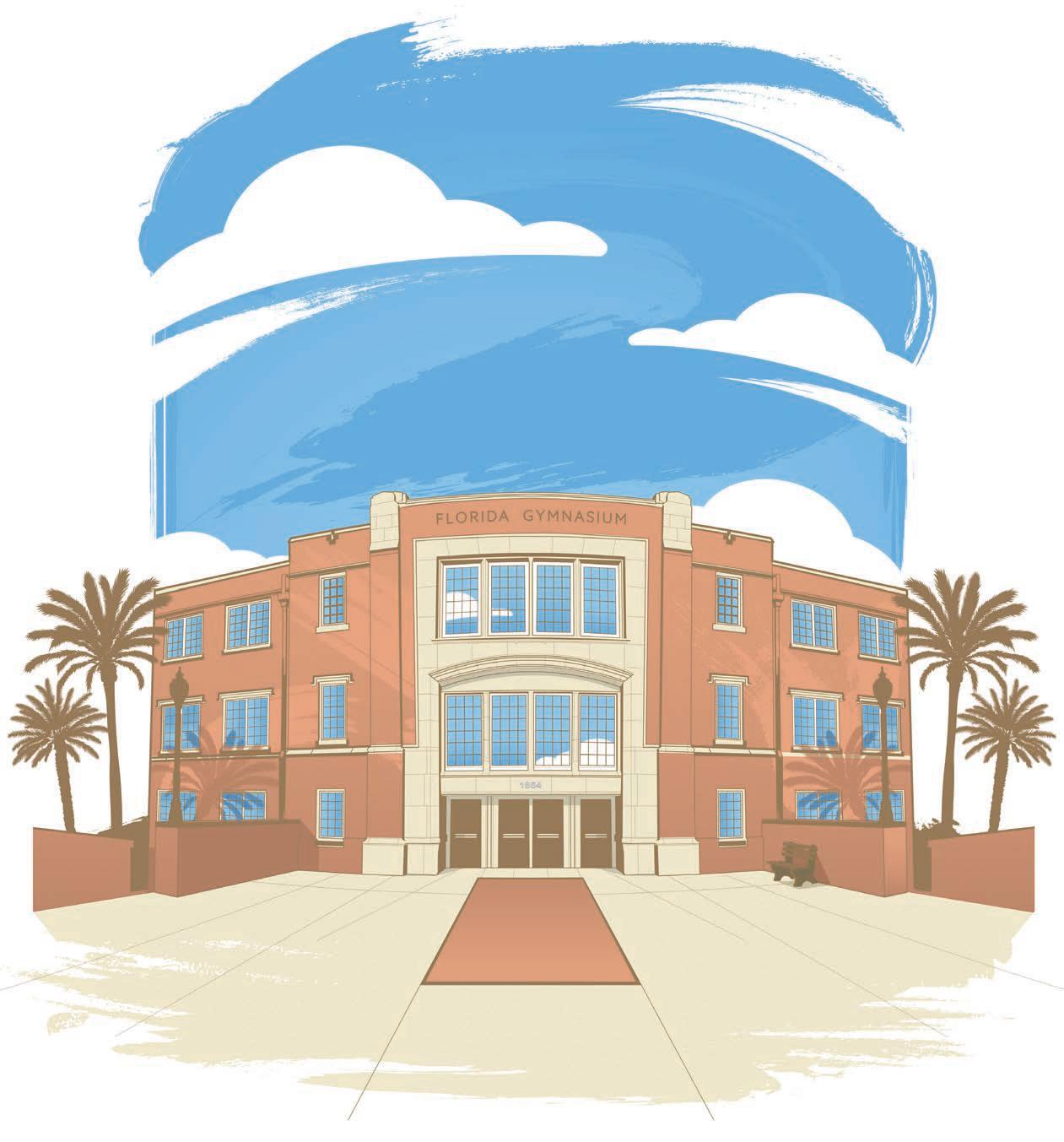
COLLEGE of HEALTH & HUMAN PERFORMANCE | SUMMER 2023
MAGAZINE | SUMMER 2023
DEAN
MICHAEL REID
EDITOR
MICHAEL SPEAR
DESIGNER
JEREMEY CLARK
CONTRIBUTING WRITER
MANNY REA
Performance Magazine is also available online at: HHP.UFL.EDU
Send letters for the editor to: Performance Magazine
P.O. Box 118200 Gainesville, FL 32611-8200 Or visit us online at... hhp.ufl.edu/communications
COVER: Illustration by local artist Justin Skaggs.
INSIDE COVER: Students attending HHP tailgate demonstrate the Gator Chomp. To learn more about this year's homecoming tailgate, visit: hhp.ufl.edu/tailgate.
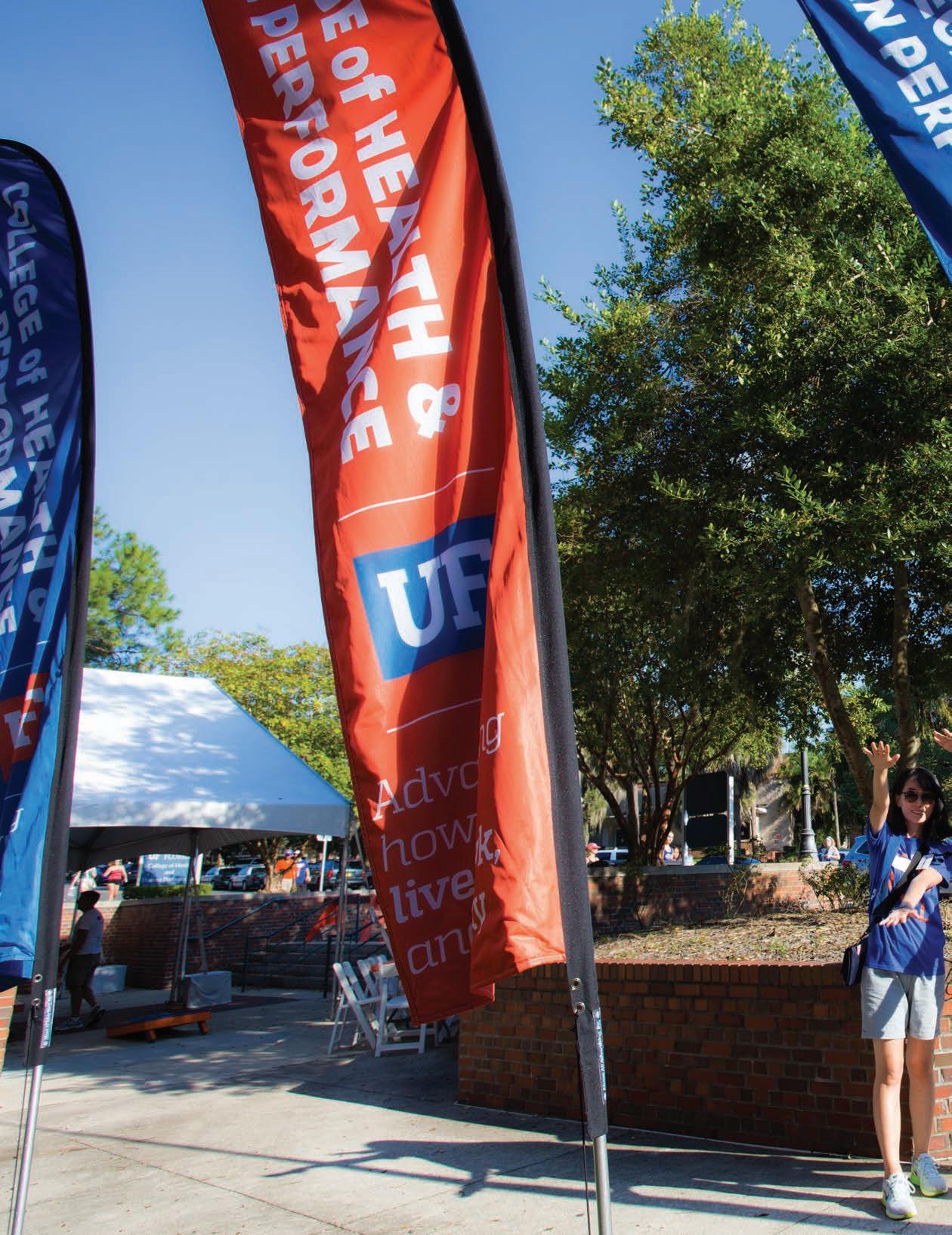
HHP DEPARTMENTS
APK – Applied Physiology & Kinesiology
HEB – Health Education & Behavior
SPM – Sport Management
THEM – Tourism Hospitality & Event Management
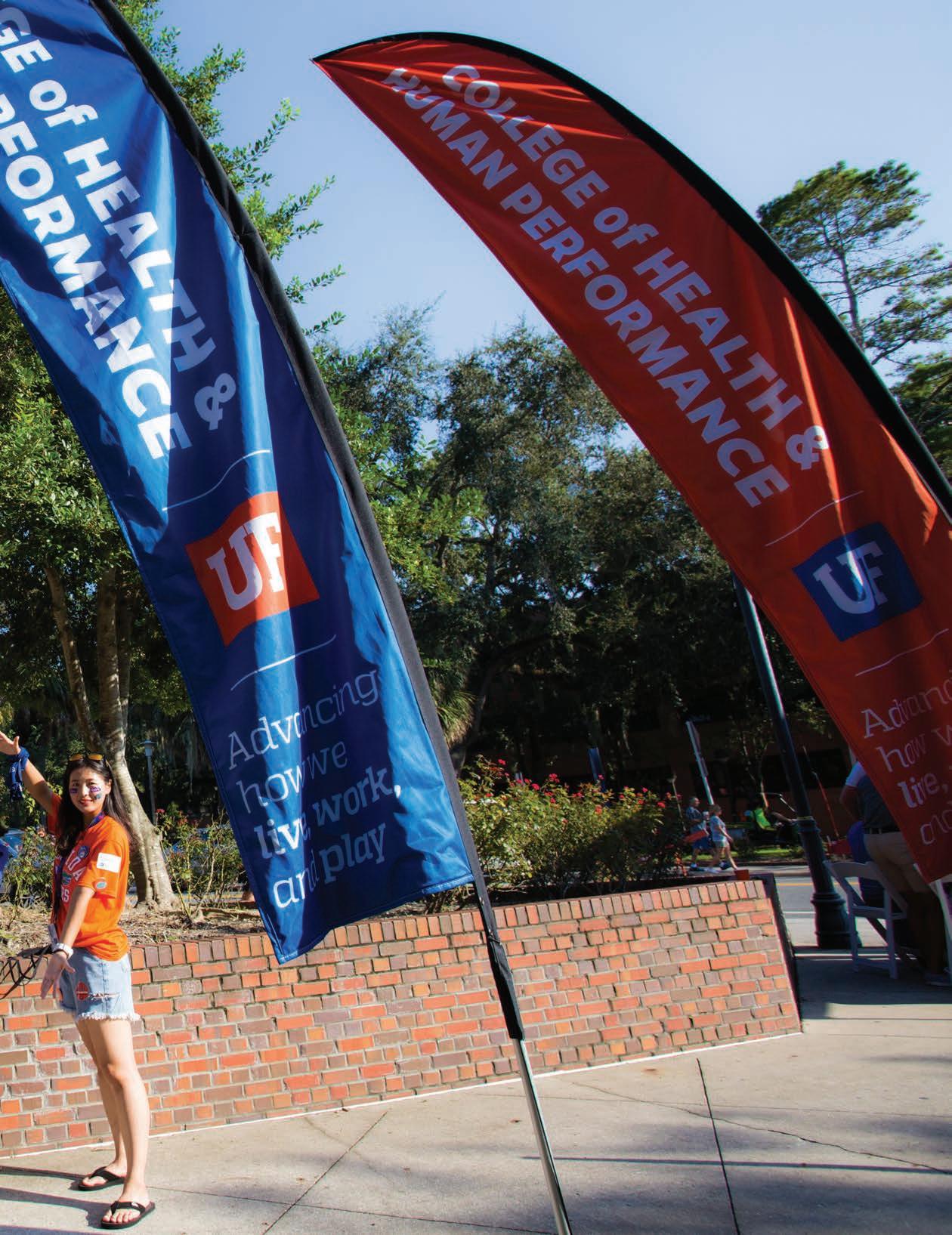
contents 5 12 14 24 30 32 34 6 Dean’s Letter ABOUT THIS ISSUE Gator Good HHP MAKING A DIFFERENCE Study Abroad A NEW APPROACH Faculty Research 14 IMPACT OF TEAM MASCOTS 16 TRAVEL VS. POSSESSIONS 18 TEACHING IN 2D 20 NATURE AS A REMEDY 22 AGING AND MOBILITY HHP Spring Awards 25 OUTSTANDING YOUNG ALUMNI 26 ALUMNI HALL OF FAME HHP By the Numbers CURRENT FACTS AND FIGURES Student Spotlight MEET FOUR CURRENT STUDENTS Class Notes
in
Help us celebrate the College of Health & Human Performance’s 75th Anniversary by making a planned gift that will strengthen our college and influence generations to come. Our goal is to reach 75 planned gifts in honor of our 75th anniversary, and WE’RE JUST NINE DONORS AWAY!
The influence your estate gift can create is vast. From supporting scholarships, to enabling the college to recruit top faculty, to providing state of the art equipment, your planned gift benefits students, faculty and the programs unique to HHP.
When you make a planned gift, you become a member of the UF Legacy Society. Membership is one way UF is able to thank you during your lifetime.
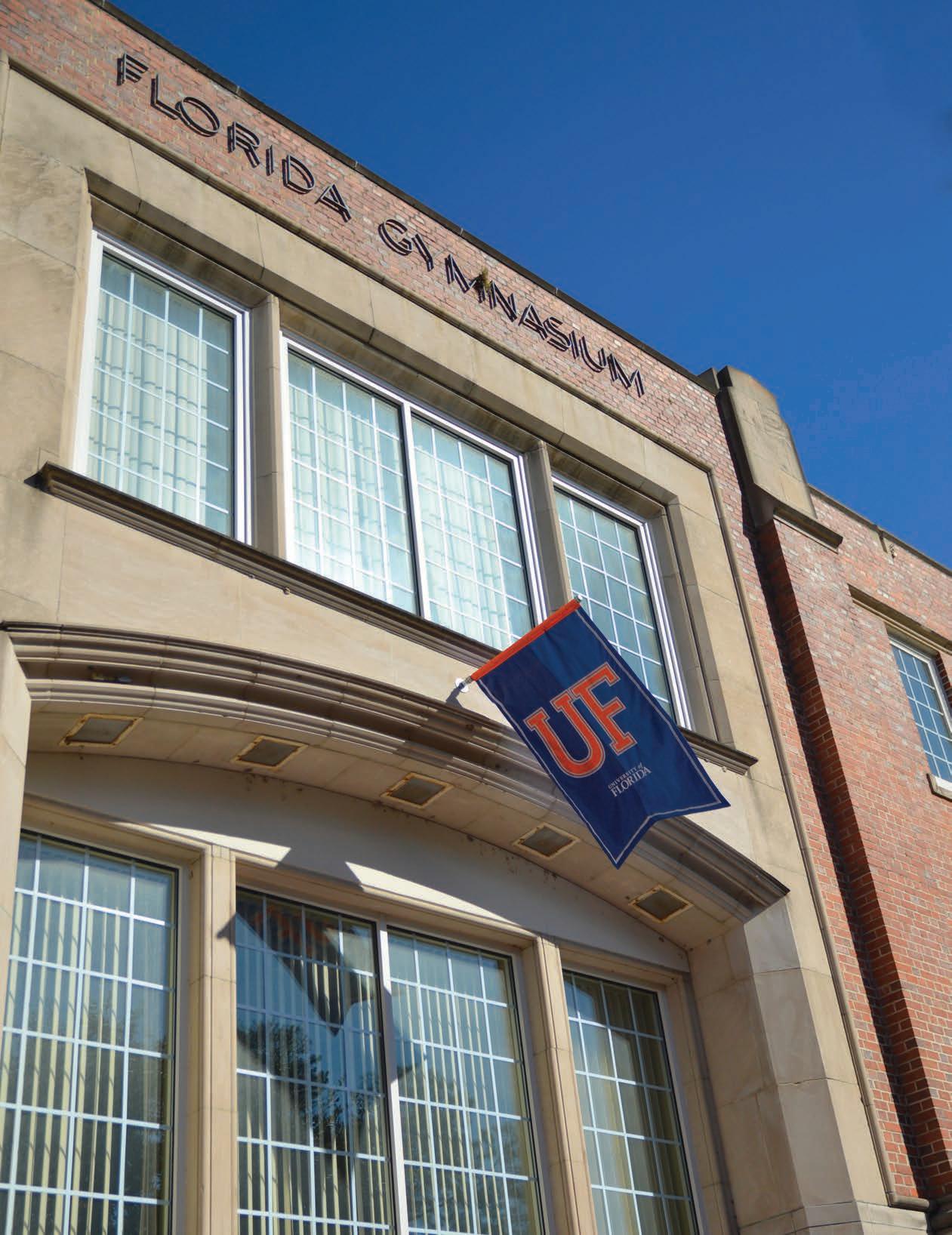
Learn how to begin your UF legacy now... CELEBRATING 75 YEARS LESLEY WATT lwatt@ufl.edu | (352) 294-1650 giftplanning.uff.ufl.edu
us reach 75 estate and planned gifts in honor of our 75th Anniversary 66 75 75
75
Help
in
from the dean
This has been an exciting year for the College of Health & Human Performance (HHP) and our community. Collaborations and strong partnerships have helped transform many of our programs.
The creation of industry advisory boards is a prime example. As of this year, every department in the College has an advisory board that brings fresh ideas from an industry perspective. Our students are already reaping the benefits through new internship programs, personal interactions with industry leaders and innovations in the curriculum.
In this issue, you’ll also learn about novel concepts being explored by our faculty. A few of my favorites include animation as a learning tool, healing through nature, the value of experiences over possessions, and the importance of staying mobile as we age.
This year, we awarded the largest number of scholarships ever to our amazing students. We also awarded two endowed professorships and the first-ever endowed chair, helping us retain three of our most prominent researchers and enhancing the reputation of our college.
It’s clear that the HHP community embraces the whole human experience — from living, to working, to playing. We could not do this work without the support of our alumni and donors.
Thank you for your support and Go Gators!
Michael Reid Dean
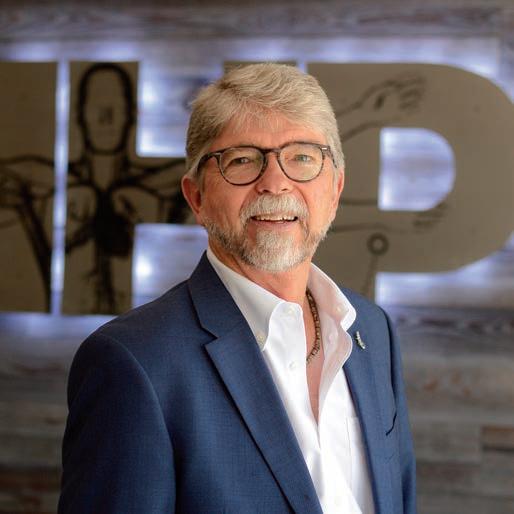
HEALTH & HUMAN PERFORMANCE | SUMMER 2023 5
gator good
FACULTY & STAFF NEWS
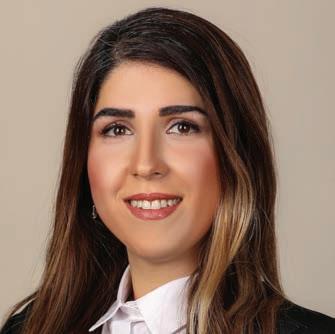
Michael Fitzgerald, career development and global engagement director, was recognized as the 2022 Staff International Educator of the Year during the International Education Awards Ceremony.
Garrett Beatty, Ph.D., instructional associate professor in APK, was recognized as the HHP Junior Faculty Educator of the Year Award winner for HHP, as well as the Virtual Exchange Training Fall 2022 Awardee. The awards recognize the outstanding contributions of UF community members to advancing the educational mission of the university on a global scale.
Nasim Binesh, >> Ph.D., assistant professor in THEM, was selected for the AI2 Award for developing a new artificial intelligence (AI) course as part of UF Quest Course Catalog. Quest courses cut across disciplines, nurture intellectual curiosities and invite students to grapple with difficult questions and challenges.
Chris Brown, Ph.D., clinical associate professor in APK, was named Southeast Athletic Training Association Educator of the Year.
George Cunningham, Ph.D., contributed to “The Conversation on Gender Diversity” through Johns Hopkins University Press. The book looks at gender diversity and the challenges faced by trans and nonbinary people.
Rachel Fu, Ph.D., chair and professor in THEM, received special recognition for leadership in tourism from Visit Gainesville.
Blain Harrison, Ph.D., instructional associate professor in APK, was awarded the Exemplary Online Award for Quality of Course Materials by the UF Center for Teaching Excellence for the course, “Nutrition Aspects of Human Performance.” The awards recognize exemplary and innovative teaching and course production.
Randall Penn, adjunct lecturer in SPM, won a Champions for Change Award, for significant contributions in the areas of sustainability, health and wellbeing, for a sports sustainability webinar series that targets sports organizers to embrace environmental programs.
Scott Powers, Ph.D., professor emeritus in APK, was awarded an honorary doctorate by the Hungarian University of Sports Science in Budapest.
COLLEGE OF HHP FACULTY, STAFF AND
Michael Reid, Ph.D., dean and professor in APK, was awarded the Honor Award at the Texas Chapter of the American College of Sports Medicine in February. The award recognizes an individual who has made outstanding contributions to exercise science and sports medicine while working in the state of Texas. Reid delivered a lecture focusing on the physiologic stress in auto racing.
Rachael Seidler, Ph.D., professor in APK, was selected as a 2023 UF Research Foundation Professor, recognizing the university’s most productive and promising faculty members.
Jalie Tucker, Ph.D., MPH, professor in HEB, and Katie Witkiewitz, Ph.D., from University of New Mexico, edited “Dynamic Pathways to Recovery from Alcohol Use Disorder: Meaning and Methods,” published by Cambridge University Press.
Zheng Wang, Ph.D., assistant professor in APK, was awarded a 2023 UF Excellence Award for Assistant Professors — one of the university’s top awards for a tenure-track faculty member. This is the fourth consecutive year an HHP faculty member has received the award, limited to 10 faculty members a year.
Christine Wegner, Ph.D., instructional assistant professor in SPM, was named a Research Fellow
6 HEALTH & HUMAN PERFORMANCE | SUMMER 2023
STUDENTS…
of the North American Society for Sport Management. In addition, she was named director of the UF Institute for Coaching Excellence, replacing Michael Sagas, Ed.D., who will be departing to serve as dean at the College of Hospitality, Retail and Sport Management at the University of South Carolina.
STUDENT NEWS
Rayven Crisafulli, Ph.D. student in THEM, earned first place at the UF Graduate Research Day for a poster on Super Bowl LV’s impact on host community sentiment and destination perceptions of Tampa. In addition, Crisafulli was awarded the UF Graduate Student Teaching Award for her demonstrated performance in the classroom.
Last spring, Astra Sharma, Women’s Tennis Association (WTA) player, was the first to earn a master’s degree in APK under a new partnership between the WTA and UF. Read more at go.ufl.edu/wta
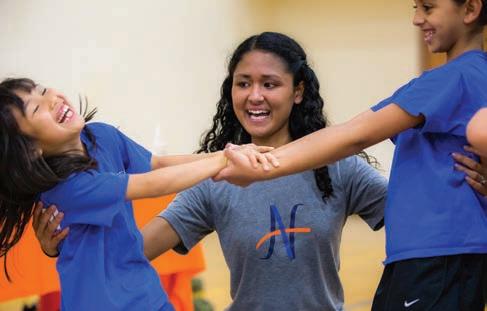
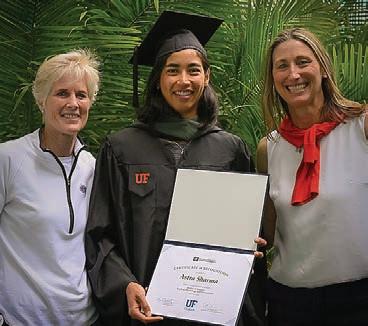
In the fall, <<-Parker Valby, BSSPM ’24, was named SEC Cross Country Runner of the Year.
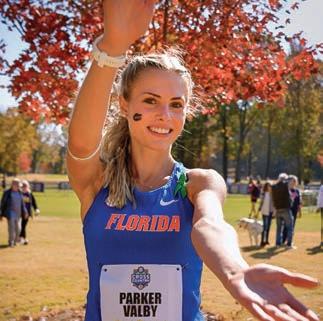
Members of the Alpha Lambda Chapter of Eta Sigma Gamma, the national health education honorary, were awarded the Chapter Excellence Award for the eighth year in a row and have earned this designation nine times overall.
In the THEM revenue management course, 137 students were awarded the Certification in Hotel Industry Analytics (CHIA) for the past two years. The certification is the industry standard allowing professionals to demonstrate their knowledge of terminology, formulas and metrics used by the hospitality industry.
Shannon Pettit and Sarah Peeling, graduate students in Health Education & Behavior, won first and second place, respectively, in the annual infographic contest hosted by the National Commission for Health Education Credentialing (NCHEC). Their winning graphics conveyed the steps to becoming Certified Health Education Specialist (CHES) certified and the value the certification brings.
Elder Garcia Varela, doctoral candidate in HEB, was selected for the Association for Academic Women’s (AAW) Emerging Scholar Award. The award honors an outstanding graduate student. In addition, Varela was inducted into the Edward A. Bouchet Graduate Honor Society in recognition of outstanding scholarly achievement and promotion of diversity and excellence.
Celebrating National Biomechanics Day — In partnership with several other UF colleges and departments, APK labs hosted events for students of Howard W. Bishop Middle School for demonstrations on motion tracking, models of traumatic brain injury, illustrations of movement measurement and balance testing.
HEALTH & HUMAN PERFORMANCE | SUMMER 2023 7 HHP MAKING A DIFFERENCE MOVING THE WORLD FORWARD.
New FACULTY
• Nasim Binesh, Ph.D., Assistant Professor, THEM; Ph.D.: Hospitality Administration, University of Nevada, Las Vegas
• George Cunningham, Ph.D., Professor and Chair, SPM; Ph.D.: Sport & Exercise Management, Ohio State University; Prior to HHP: Texas A&M University
• Diego Guarin, Ph.D., Assistant Professor, APK; Ph.D.: Biomedical Engineering, McGill University, Montreal, Canada; Prior to HHP: Florida Institute of Technology
• Orlando Laitano, Ph.D., Assistant Professor, APK; Ph.D.: Human Movement Sciences, Federal University of Rio Grande do Sul, Porto Alegre, Brazil; Prior to HHP: Florida State University
• Giulio Ronzoni, Ph.D., Instructional Assistant Professor, THEM; Ph.D.: Hospitality Management, University of Central Florida, Orlando; Prior to HHP: University of Hawai‘i at Mānoa, Honolulu
• Bradley Wilkes, Ph.D., Research Assistant Professor, APK; Ph.D.: Psychology, University of Florida
• Melvena Wilson, DrPH, Instructional Assistant Professor, HEB; DrPH: Behavioral Science and Health Education, Florida A&M University; Prior to HHP: Tuskegee University, Tuskegee, Alabama
New STAFF
• Ivonne Calderon, Research Coordinator II, HEB
• Melissa Cunningham, Development Coordinator, Dean’s Office
• Taylor Graves-Boswell, Research Coordinator III, HEB
• Brandon Hartline, Administrative Assistant, Dean’s Office
• Laine Hatcher, Academic Advisor, SPM
• Spencer Henley-Beasley, Biological Scientist, APK
• Mara Higginbotham, Clinical Research Coordinator, APK
• Justin Jones, Administrative Support Assistant III, HEB
• Ben Kahler, Research Administrator II, APK
• Manju Karki, Research Coordinator III, HEB
• Annie Kearley, Research Administrator I, Dean's Office
• Deborah Morse, Biological Scientist, APK
• Nathan Service, Administrative Support Assistant, SPM
• Claire Wilhelm, Clinical Research Coordinator I, APK
• Qingping Yang, Biological Scientist, APK
STAFF Transitions
The following HHP staff members recently took on a new role within the college.
• Laura Barnes, Industry Advisory Board Liaison, Dean's Office
• Michael Fitzgerald, Career Development and Global Engagement Director, Dean's Office
• Johnna Lechler, Administrative Support Assistant III, APK
• David Pinner, Assistant Director of Development, Dean’s Office
8 HEALTH & HUMAN PERFORMANCE | SUMMER 2023
Over the past year, the college welcomed new faculty and staff and recognized outstanding achievement .
Celebrating New Faculty Endowments
At the 2023 spring awards ceremony, Dean Reid announced two new endowed professorships and the first endowed chair in the college. Endowed faculty allow the college to permanently fund a faculty member, supplementing salary and research funding. Endowments help the college attract and retain the top talent and enhance the reputation of the college. Congratulations to these outstanding faculty members and thank you to our generous donors.
• George Cunningham, Ph.D., University Athletic Association Professor in Sport Management
• Jalie Tucker, Ph.D., MPH, Mary F. Lane Professor in Health Education & Behavior
• David Vaillancourt, Ph.D., Inaugural Orchid Chair in Applied Physiology & Kinesiology
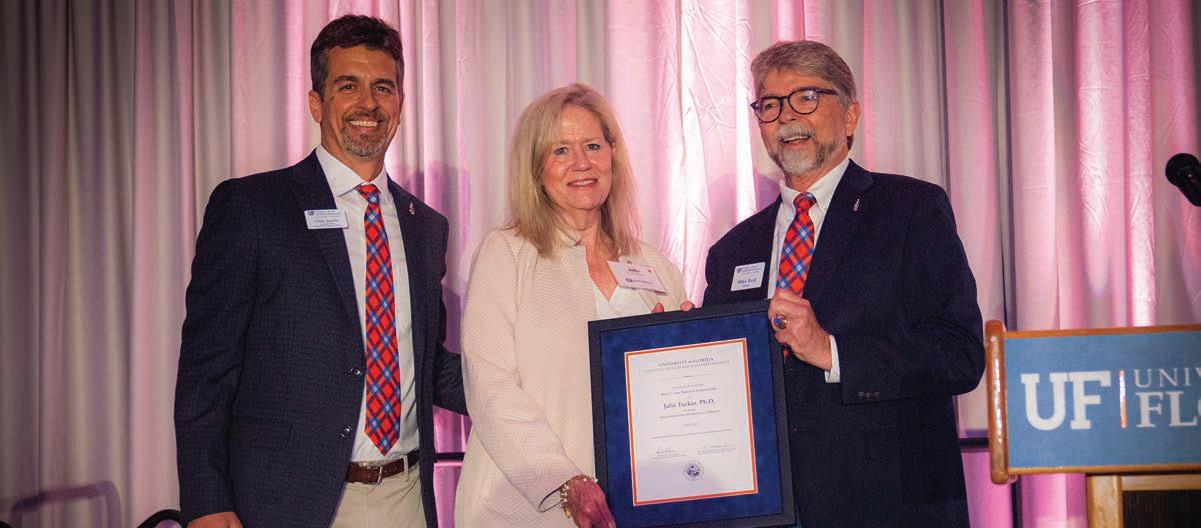
In addition, HHP has one additional endowed faculty member. Thomas Clanton, Ph.D. is the BK and Betty Stevens Professor in Applied Physiology & Kinesiology.
Faculty Promotions
This summer, the following 12 faculty members earned promotions or a promotion with tenure.
PROFESSOR
Leo Ferreira, Ph.D., APK
Svetlana Stepchenkova, Ph.D., THEM
CLINICAL PROFESSOR
Brady Tripp, Ph.D., APK
Patricia Tripp, Ph.D., APK
ASSOCIATE PROFESSOR WITH TENURE
JeeWon Cheong, Ph.D., HEB
Jinwon Kim, Ph.D., THEM
Megan McVay, Ph.D., HEB
Terence Ryan, Ph.D., APK
INSTRUCTIONAL ASSOCIATE PROFESSOR*
Kristina Garcia-Guettler, Ph.D., HEB
Diba Mani, Ph.D., APK
Alyssa Tavormina, Ph.D., SPM
Christine Wegner, Ph.D., SPM
HEALTH & HUMAN PERFORMANCE | SUMMER 2023 9
HHP MAKING A DIFFERENCE
*Title reflects HHP working title for instruction-intensive faculty. Officially, faculty were promoted to senior lecturer.
HHP in the news
FACULTY
Workcations: The travel trend mixing work and play BBC Worklife
“Home is school, home is where we work. We have all been trained to switch: ‘OK, now we have a Zoom meeting.’ I think after the past two years, we can switch from one thing to the next very effectively.”
Rachel Fu, Ph.D., chair and professor in THEM
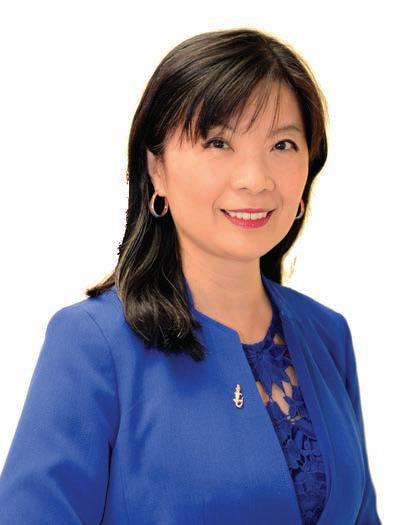
“How NFL teams use Black coaches to clean up their messes” Washington Post
“You’re kind of set up to fail. You’re already in a tough spot. And the short audition time, whether it’s two or three games or even a half a season, is just not putting you in a good spot to succeed.”
George Cunningham, Ph.D. chair and professor in SPM
“What It’s Like to Retire in Your Early 20s” The Atlantic
“All the great transferable skills that you gain as an elite athlete can be extremely useful, but only if you actually find a new path, a new goal.”
Elodie Wendling, Ph.D. instructional faculty in the Institute for Coaching Excellence
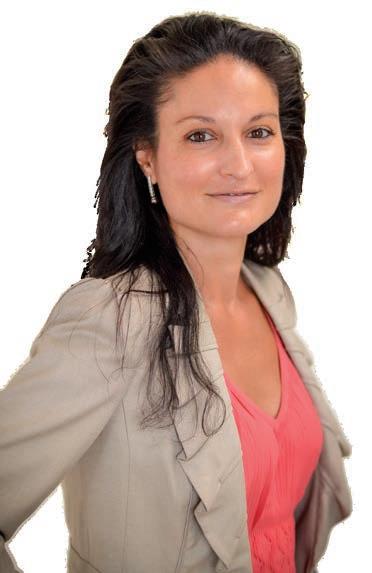
“Who plays football once a week is active or sedentary?” BBC Brasil
“Studies carried out in the last two decades have shown that even those people who met the exercise recommendations, but spent the rest of the day sitting, lost part of the benefits. [If you] stay still all day at the office, a large part of the exercise gains are masked.”
Orlando Laitano, Ph.D. assistant professor in APK
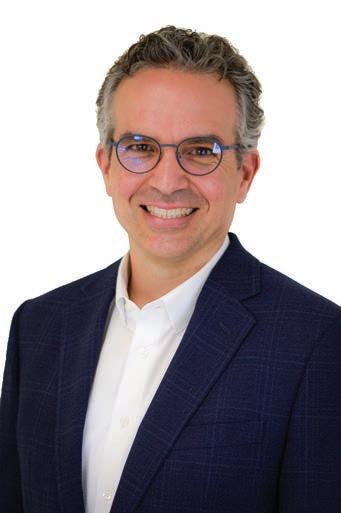
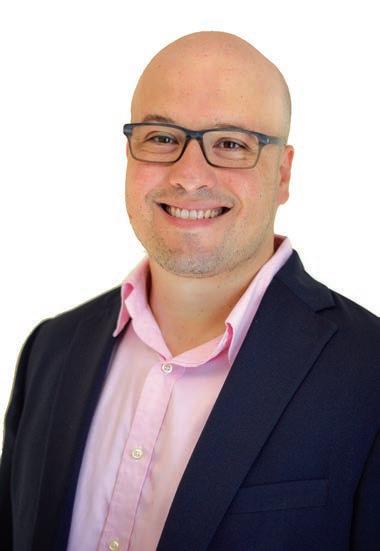
10 HEALTH & HUMAN PERFORMANCE | SUMMER 2023
employers...
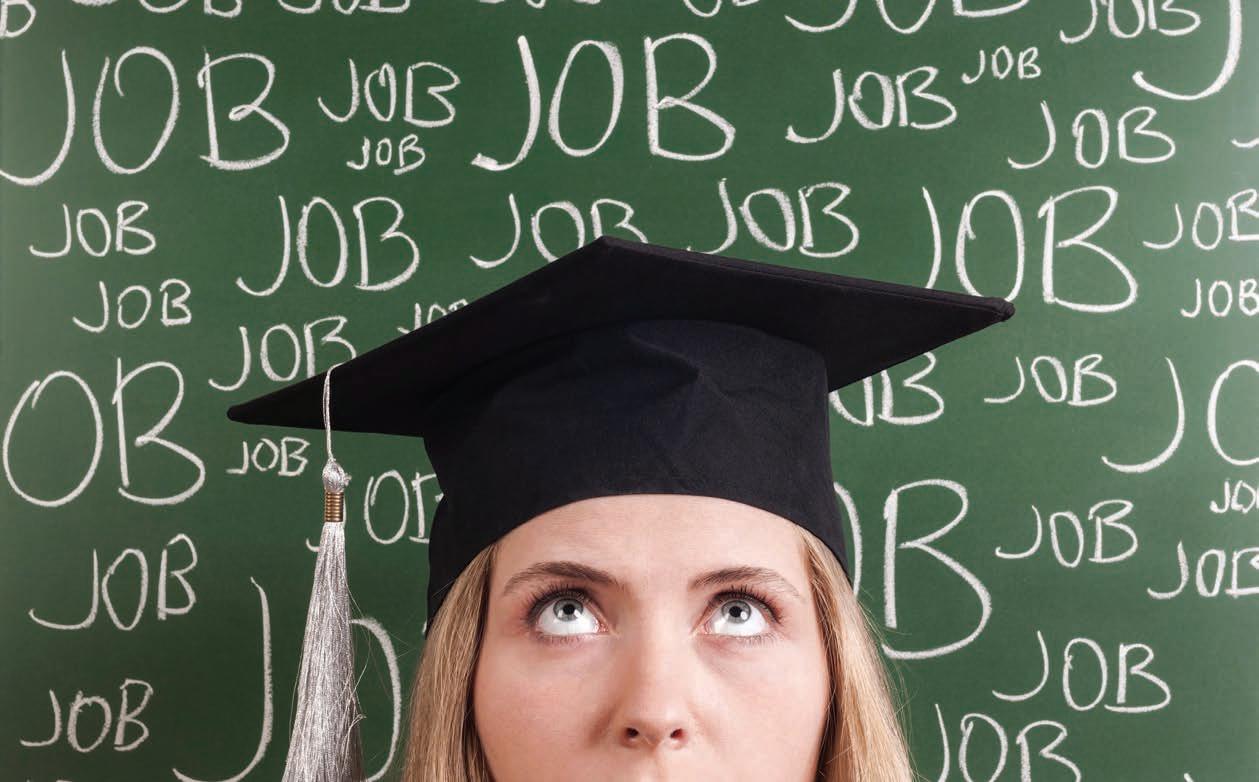
Are you interested in recruiting HHP students for internships and jobs?
The College of Health and Human Performance is hosting our fall Internship & Job Fair at the Florida Gym. The event is an effective way to to directly connect and recruit students in our college who are pursuing areas of study that impact the way we live, work and play in today's society.
INTERNSHIP & JOB FAIR
Wednesday, Sep. 27 10:00am – 2:00pm
Florida Gym | UF Campus
Gainesville
Our students major in the following areas:
• Applied Physiology and Kinesiology
• Health Education and Behavior
• Sport Management
• Tourism, Hospitality and Event Management
QUESTIONS?
Please contact Michael Fitzgerald, Director of Career Development and Global Engagement, at mgfitzgerald@ufl.edu
HEALTH & HUMAN PERFORMANCE | SUMMER 2023 11
DETAILED INFO @ hhp.ufl.edu/fair
Last summer, HHP took members of its undergraduate cohort on a study abroad trip to Italy, a trip to the Boot that happens about every three years. This expedition, however, is the first of its kind to bring all departments together. This summer, students head to London and Paris.

“The first college-wide study abroad program was the culmination of collective, dedicated effort among many HHP stakeholders to fulfill a longstanding vision of engaging faculty, staff, and students from the entire HHP family in a rich and exciting common study abroad experience,” Chris Janelle, Ph.D., professor in the Department of Applied Physiology and Kinesiology and associate dean for academic and student affairs, said. “The common experience not only provided an amazing opportunity for global engagement, but it was viewed through the eyes, minds and perspective of participants from our wide and varied HHP disciplines,” he added.
Last year’s trip took 43 students and four faculty through historical cities including Venice, Florence and Rome — all places bound with opportunities to learn for all the majors. For example, students were given a sports psychology lecture outside the Colosseum with tales of the gladiators woven in. Others in the tourism major were taught in St. Mark’s Square and then asked to interview local restaurant owners for a class on “the European café.”
In other moments, faculty would integrate their teachings together through excursions that combined students with different backgrounds, said Michael Fitzgerald, HHP’s director of career development and global engagement who also joined the trip. “It allowed HHP students who maybe never get to talk to people in other HHP majors to get to know them and learn about what they do,” Fitzgerald said.
Cyntrice Thomas, Ph.D., JD, instructional assistant professor and graduate coordinator in the department of sport management, also noticed this collaboration among students while on the trip. “It was nice when they were able to socialize and interact in group excursions and their free time to explore,” Thomas said. “I think many of them made friends and met people outside of their classes that they wouldn’t have otherwise had the chance to meet.”
The teamwork across disciplines applied to the faculty side as well. “Having other instructors on the study abroad was a positive because I was able to bounce ideas off of my colleagues and it was nice to have others there for support and friendship,” Thomas added.
The trip to Italy also helped to refine the educational framework for future studies abroad. Traditionally, some courses were taught on the same day which meant students may have needed to get from one location to the next in a short timeframe. Now, professors will only teach one per day to give ample time for material. “Ultimately, these challenges led to opportunities for enhancement of the inaugural and forthcoming experiences,” Janelle said.
Up next for HHP includes a second cross-discipline expedition to London and Paris where students will get another chance to engage with their peers from across the college.
12 HEALTH & HUMAN PERFORMANCE | SUMMER 2023
...students were given a sports psychology lecture outside the Colosseum with tales of the gladiators woven in.
A LASTING IMPRESSION
First college-wide study abroad brings HHP students from all majors together
 by Manny Rea
by Manny Rea
ANIMAL
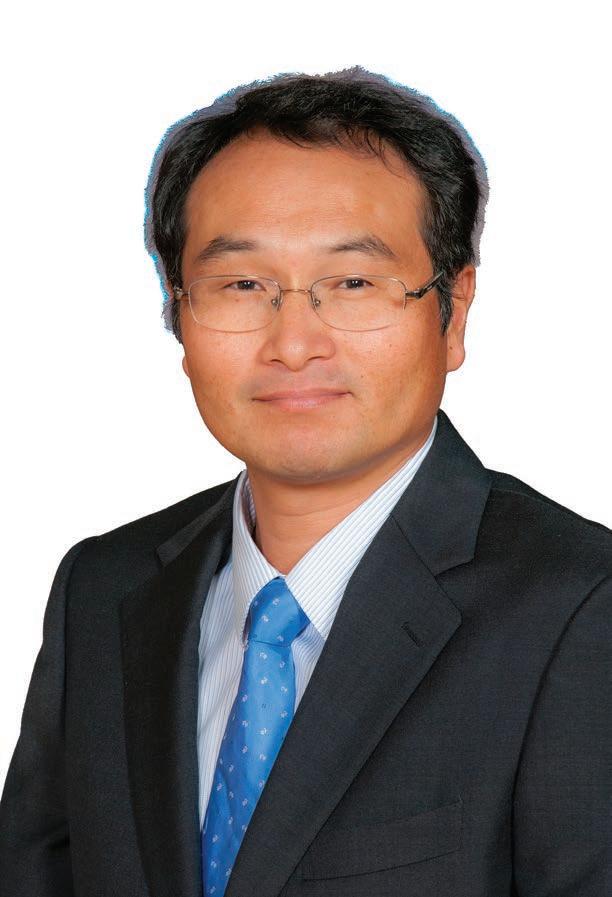
the power of team mascots
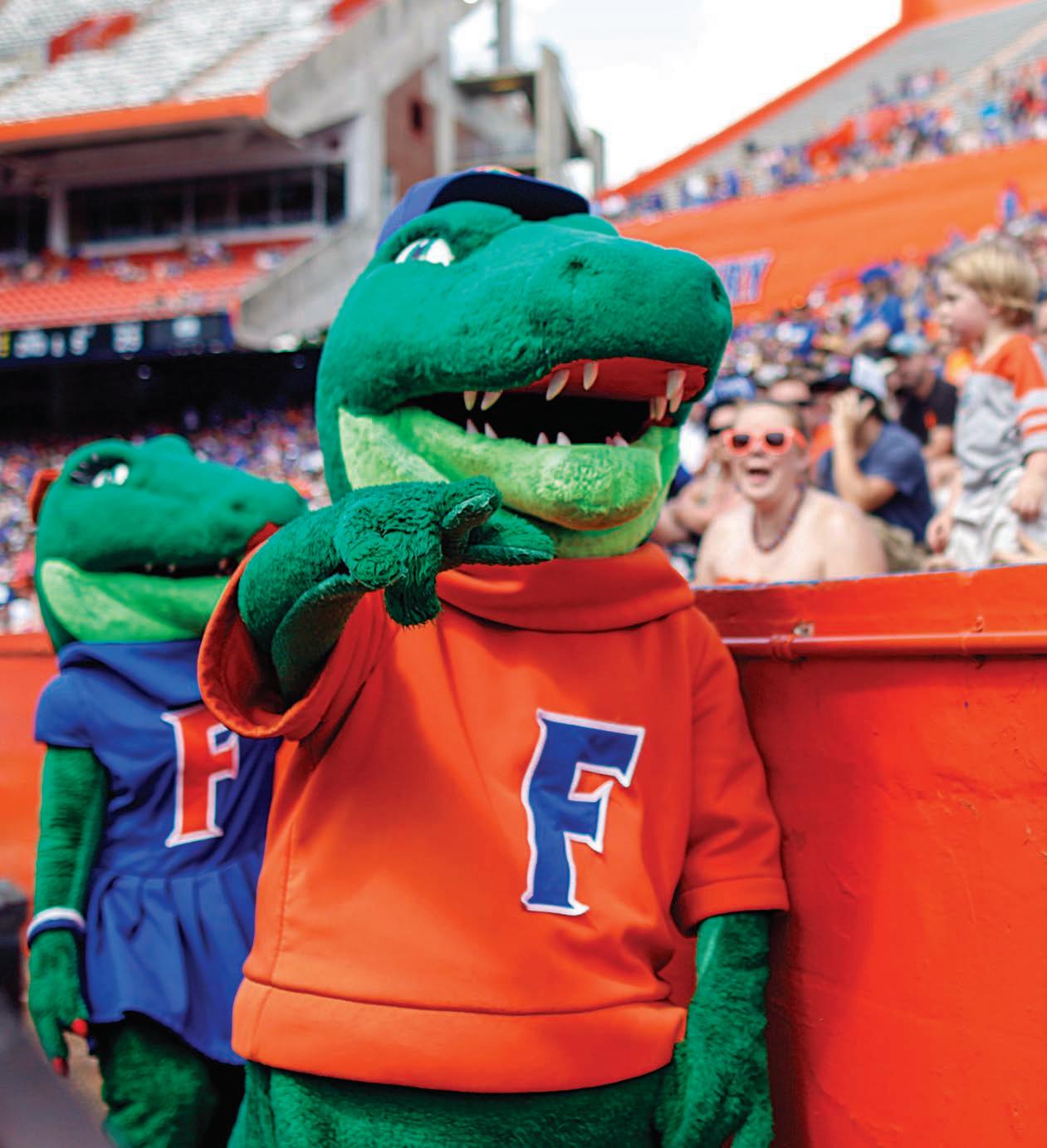
attraction
by Manny Rea
Yong Jae Ko, Ph.D. professor in sport management
>> Albert the Alligator dons a turtleneck and cap. Alberta sports a bow and a cheerleader uniform. Their accessories demonstrate anthropomorphism, the humanization of a nonhuman thing using recognizable characteristics. It’s a process that’s been used for years to bring life to a sports team’s fanfare, but do the costumed characters work on future fans?
For the last decade, Yong Jae Ko, Ph.D., professor in sport management, has evaluated sports teams, athletes and coaches as a brand for marketing. He has contributed to the first literature to consider athletes as a brand which offers input on how to manage their image.
In his most recent paper though, Do humanized team mascots attract new fans? Application and extension of the anthropomorphism theory, Ko and company extended the importance of sport branding to the wacky creatures that often reside on court sidelines.
Ko worked with Yonghwan Chang, Ph.D., assistant professor in sport management as well as Akira Asada, Ph.D., assistant professor in sport management at Texas Tech University, Wonseok (Eric) Jang, Ph.D., assistant professor in sport science at Sungkyunkwan University, and Daehwan Kim, Ph.D., assistant professor in the Department of Marine Sports at Pukyong National University — all former students of Ko.
“The team mascot represents the identity and image of the athletic teams and the university itself,” Ko said.
Regardless of these ties, the researchers felt that teams have little guidance on how to use the appeal of their mascots when promoting their team brand.
Human-like brands are present in everything from dish sponges to cereal characters as a way to sell products. Humanization helps to close the psychological distance between brands and consumers. A positive interaction can then be made between the two — a practice which can be brought into the sports world, too.
Ko recalled a time the Olympics stopped in his home country of South Korea. During the 1988 summer games the Korea Olympic Committee created mascots to reflect the culture and people of the host nation. Hodori and Hosuni were a pair of Amur tigers plastered on souvenir cups, pins and shirts.
“It sold out,” Ko said. “Immediately sold out.”
Ko also noted that this psychological closeness can be maximized for people experiencing loneliness. His team hypothesized that the effect of anthropomorphism is stronger for those who feel lonely and that increased closeness may lead them to watch games and buy merchandise.
The study included Miami Marlins mascot Billy alongside other team logos on various promotional materials sent to participants to gauge their interest in the team.
The results from 239 baseball spectators in the U.S. indicated
that a sport team’s use of mascots increased its perceived anthropomorphism greater than just using logos. It also supported its hypotheses that this anthropomorphism is positively related to fans’ psychological closeness which is furthermore positively related to media consumption intentions. Lastly, it supported their hypotheses that a consumers’ loneliness creates greater closeness to a team and its mascot.
Whether from a merchandising or fandom perspective, Ko believes teams should continue to invest in building up their mascot branding. He said research outcomes associated with anthropomorphism and team mascots can offer meaningful solutions for public health improvement and improve revenue for the team.
“Many psychologists express concern that the coronavirus pandemic has triggered a ‘loneliness’ epidemic worldwide,” said Ko. “Mascots can help bring people back to the game they love, especially as collegiate and professional sports face declining ticket sales and deal with critical social issues.”
Ko plans to continue his research on the psychological effects of humanized mascots by focusing on current and potential fans’ emotion and socialization process.
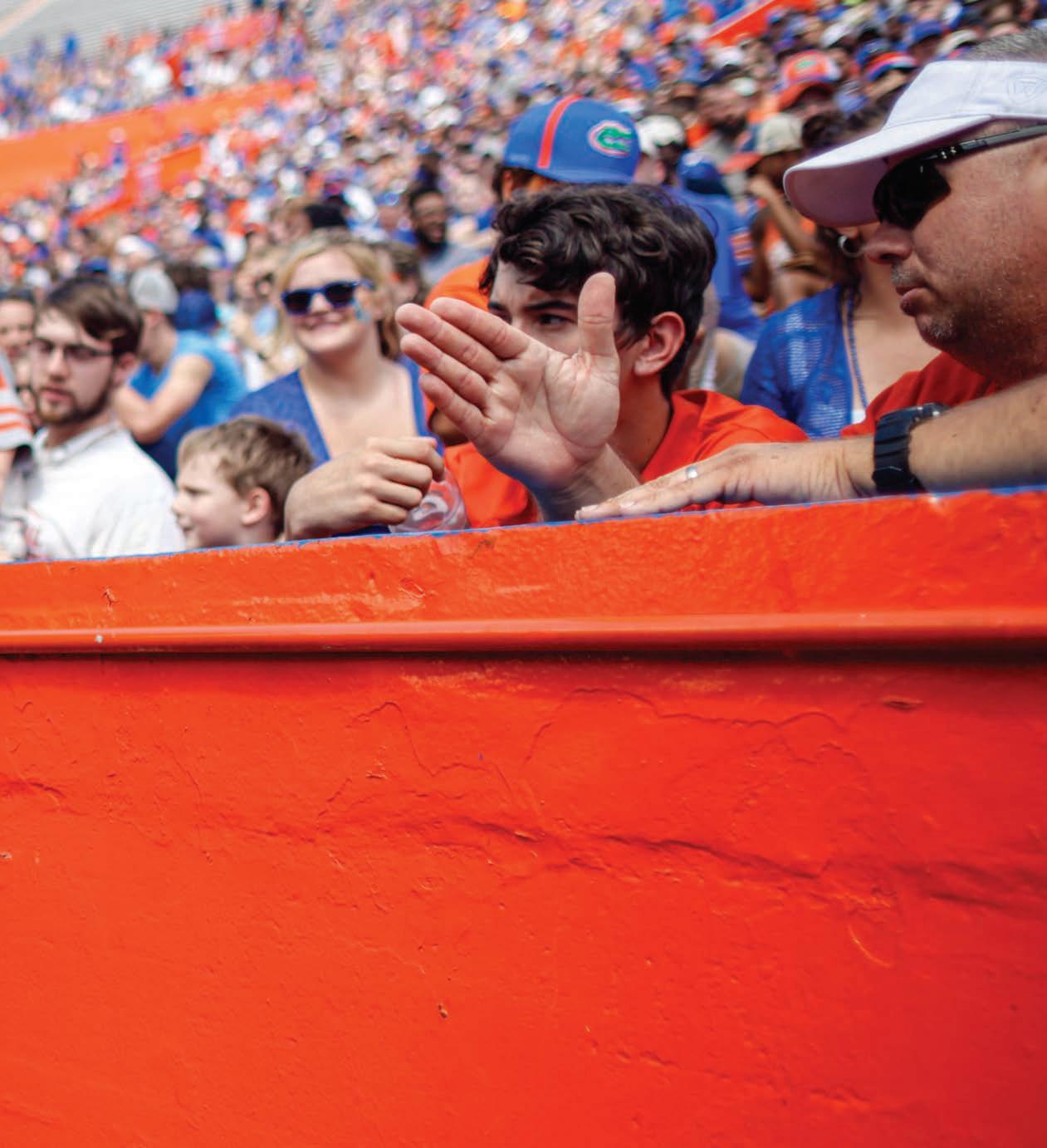
FACULTY RESEARCH
An HHP researcher is studying how travel experiences can lead to greater feelings of happiness among tourists.
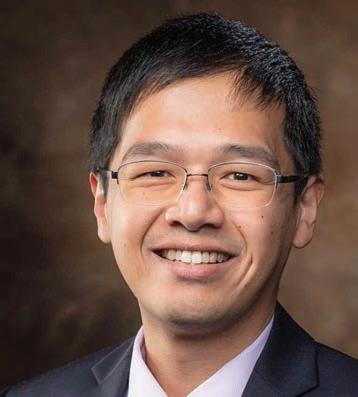
happy campers
by Manny Rea
Common consensus has always dictated that paying for experiences is more valuable than collecting possessions. But how can travel companies apply this principle to their business strategies?

Yao-Chin Wang, Ph.D., assistant professor in the Department of Tourism, Hospitality & Event Management, researches how technological experiences and artificial intelligence can support human mindfulness in the hospitality and tourism industries. Mindfulness refers to the ability to be fully present and aware of one’s surroundings in the moment.
In the case of his recent study, Would Travel Experiences or Possessions Make People Happier?, Wang and two other researchers focused on the marketing side of consumer psychology and how tourism businesses and destinations can maximize long-term happiness for visitors.
Wang differentiated happiness into two opposites: hedonic and eudaimonic happiness. Hedonic happiness refers to the pursuit of short-term pleasurable experiences while eudaimonic derives from the fulfillment of higher-order psychological needs — leading to feelings of purpose and inner peace.
In the context of travel, Wang believes tourism businesses can curate greater enjoyment for their guests by emphasizing experiences that elicit eudaimonic happiness such as when engaging with novel environments, breaking away from routine and making new social connections all while on vacation.
The study tested this thought through an empirical experiment based on four hypotheses positing that eudaimonic consumption will always generate greater happiness whether in general or in tourism.
He and his colleagues asked study participants about purchases they had recently made with the intent of furthering their life happiness. In a specific example, participants were asked about any purchases made in the last six months that cost more than $50 and whether they felt a greater sense of enjoyment or a sense of indulgence from the purchase. Their hypotheses were supported across the board.
They would find sufficient evidence from more than 450 responses collected since 2019 that supported their belief that eudaimonic consumption would create greater happiness in general and with their tourism angle. They would also confirm their hypotheses that when consumption is made with a eudaimonic motive, there is no difference in happiness between those who consume tourism experiences and those who consume possessions.
On the flip side they also supported their final hypothesis that when a consumption is made with a hedonic motive, those who consume tourism experiences are happier than those who consume possessions. So, what does this mean for tourism companies?
“Number one, when branding your destination, don’t think just about hedonic statements but think also about the eudaimonic opportunities customers can join in on,” Wang said.
Several instances of the practice exist such as with New Zealand’s tourism slogan, “100% Pure New Zealand.” He said this kind of marketing showcases eudaimonic values such as being free, mental clarity and embracing the true self, which can elicit a happier response from visitors of the country.
Some of these branding efforts are even being done from the living room. Wang cited AirBnB’s online experiences as another way companies are fulfilling eudaimonic happiness by offering opportunities for customers to see the world by touring the Taj Mahal virtually from the comfort of their home.
Businesses can also find ways to combine material purchases supplemented with experiences whether online or in person with classes in cooking, exercise and yoga. By offering the experience first and the goods second, from yoga mats to pots and pans, customers can ultimately extract greater happiness.
It’s this online aspect that Wang wants to explore next. One of his current research proposals aims to support mindfulness through an augmented reality platform that uses natural sounds and guided meditation of major destinations all through a website.
“Here we can really think about how to combine material purchases and a higher level of happiness when designing a tourism experience,” Wang said. “Even if they don’t have a chance to go outside, we can create an outdoor experience for potential viewers to enjoy natural beauty.”
HEALTH & HUMAN PERFORMANCE | SUMMER 2023 17 FACULTY RESEARCH
Brian D. Avery is a lecturer and director of engaged learning and outreach in the Department of Sport Management. He teaches in person out of the Florida Gym for residential and online students, but online he also uses a recently developed 2D avatar: a cartoon character dubbed “The Mr. Frizzle of Risk Management.”
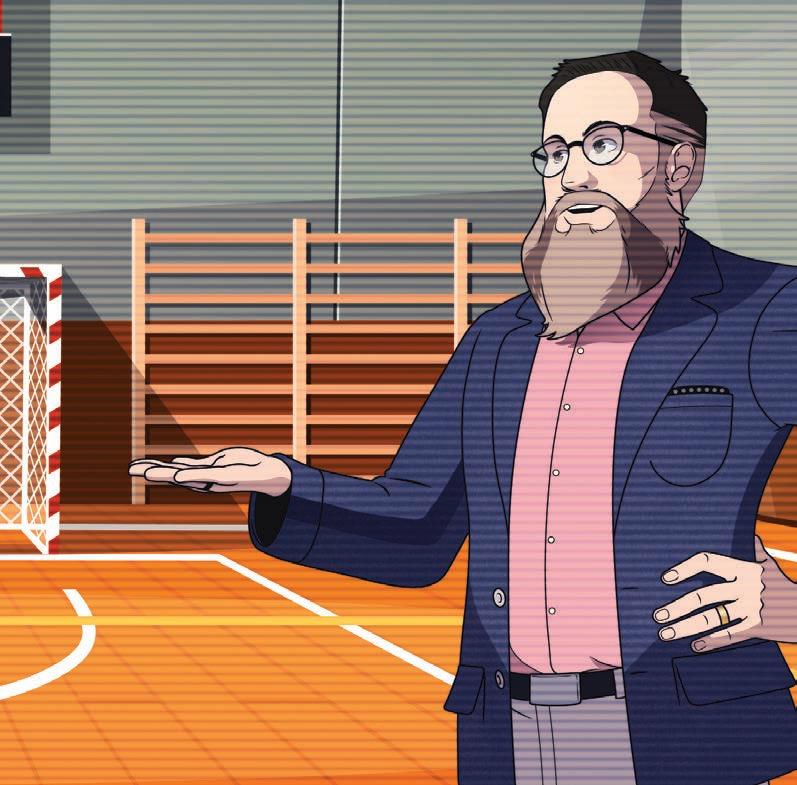
Avery chose this role as an animated character for his lectures on legal and risk management as a hark back to the lessons taught through television screens by shows such as “The Magic School Bus” and “Arthur.” To start, he and his team picked a 4000-level course entitled Advanced Legal Aspects in Live Entertainment & Sports for this foray into 2-D animation.
The class was previously delivered online, but Avery and Kelly Beck, an instructional designer from UF's Center for Online Innovation and Production (COIP), were toying with ways to help students better
understand their place in the legal processes for injuries and incidents.
In this class, students learn the legal responsibilities regarding how to assemble mass groups of people for the purpose of entertainment and sport and how to do so safely. There are hazards that someone may face when attending an event whether as an audience or staff member, athlete or performer, and the aim is to teach how to prevent injuries and incidents when running entertainment, sport and attraction activities and how to deal with legal fallout should something occur. But, says Avery, “teaching the law
online is a very difficult concept because it’s not just black and white — it is many shades of grey. It's important to gain perspective from the individuals that are a part of the process in order to understand, ‘what's my role?’ and ‘how do my decisions impact the greater good?’’’
To better help students, Avery and Beck came up with the idea for an animated-style lecture series: a cartoon version of Avery would deliver an outline of a legal case study while a cast of characters would personify the real people and issues involved in these incidents.
JUDGEMENT RENDERED2D in
by Manny Rea
18 HEALTH & HUMAN PERFORMANCE | SUMMER 2023
He and the designers at COIP then spent a year creating a first-of-its-kind class using dialogue scripts, video editing, voice overs and animation.
The class features live lecture content followed by a case study featuring the animated characters. Students are then asked to answer questions based on the perspectives of the characters and previous material on the legislation, regulations and standards that apply to the situation.
A mock trial follows, and students build or answer complaint files, attend depositions and then hear motions — just as if they were to go to trial in real life. The newly developed animated storytelling is designed to flesh out the emotions of the people involved on both sides of the case and to ultimately help students determine who is responsible for the accident based on industry standards.
A case study Avery uses is that of a high school basketball player who is left a quadriplegic after running and slipping into a gymnasium wall behind the court baseline. Students must consider the perspectives and roles of coaches, referees and facility managers in contributing to the conditions that caused the injury and ask questions like who oversaw the waxing of the floors that made it too slippery or who approved him to play in worn-out tennis shoes? And who designed the unpadded walls to be so close to the baseline?
“I wanted students to step out of themselves and step into someone else’s shoes to gain perspective on how our decisions impact others in these venues," says Avery. "We don’t want to continue to make the same mistakes and create hazardous environments.”
When the redesigned course first rolled out last fall, Avery was watching for how the new approach would impact the students. What he saw was that their responses to the case studies he presented were often reflective of his own.
As Avery has had real-life involvement in the case studies, he realized his own biases were showing in his lecture. He decided to take a more neutral approach and let the animated segments do the talking. While slow at first, he felt that more and more students broadened their understanding and empathy as they engaged further with the material.
“At the beginning of the semester, they'd have very strong opinions about why certain groups of people or individuals in certain settings should or should not have done things — end of story,” he said. “At the end of it, they realized it is more complex. Using perspective, there’s no right or wrong answer in some situations, and that’s what I really wanted them to walk away with.”
The class has moved into its second offering and is allowing more students to peer into the world of legal aspects for entertainment and sports with the continued guidance of cartoon Avery.
“My family has told me I’m very animated and that I’m a character but never in a million years would have thought myself as an animated character,” Avery laughed. “My wife called me the ‘Mr. Frizzle of Risk Management.’”

HEALTH & HUMAN PERFORMANCE | SUMMER 2023 19
FACULTY RESEARCH
HHP lecturer teaches sports and live entertainment legal and risk aspects in animated form.
It's in Her
by Manny Rea
Mother nature’s simplest forms of greenery may be enough to help curb problematic drinking risks. One of the latest nature studies from the Department of Health Education and Behavior (HEB) explores just how greenspaces could be a tool in treatment for limiting alcohol and substance use harms.
Shahar Almog, an HEB Ph.D. student, remembers there being something unique about the exercise class she used to lead back in Israel. Mothers would bring their babies in strollers to the park to participate together, and while the mother-child connection was part of it, the added natural element is what made these sessions so special for Almog and her participants, she said. Fast forward 15 years, and Almog is working to complete her Ph.D. by researching how nature can affect mental health, alcohol and substance use.
Almog chose to study the relationship between nature and alcohol use because of a gap in knowledge on the effects of the outdoors on people with substance use disorders. Impulsive decision making and negative affect, or the swath of negative emotions such as anxiety and depression, can be risk factors for problematic drinking. Ultimately, this behavior can lead to injury and even death. According to the Centers for
Disease Control and Prevention, excessive alcohol use contributed to more than 140,000 deaths in the U.S. between 2015 and 2019.
The immediate dangers of this behavior prompted Almog to explore a solution as a first-time primary author of the article, “Spending Time in Nature Serves as a Protective Factor against Problematic Alcohol Use: A Structural Equation Modeling Approach.”
Recruiting more than 300 participants from a crowdsourcing survey site, Almog set out to capture responses from a study sample representative of the drinking trends in the U.S. She developed two structural equation models (SEM) to find associations between exposure to nature and alcohol consumption as well as alcohol-related problems. Using SEMs allowed for Almog to consider differences between time deliberately spent in nature and passive exposure to neighborhood greenness as well as the demographics of her participants which may all have played a role in forming the answers they gave to the survey.
Almog would find in her survey results that general alcohol consumption is related to both positive or negative moods. In other words, feeling good or bad
20 HEALTH & HUMAN PERFORMANCE | SUMMER 2023
A passion for nature leads HEB researcher to explore its positive effect on curbing risky alcohol and substance use
Nature
were both related to increased drinking. However, problematic drinking, which can lead to injury, forgetfulness or other harmful consequences, was only associated with negative mood. Lastly, nature was found to be related to improved mood. She concluded that intentionally spending time in nature may reduce problematic alcohol use by first reducing negative affect.
Almog saw that participants often reported feeling that they took nature for granted. This emphasized the research team’s belief that access to greenspaces and education efforts on the benefits of deliberate interaction with nature could be essential to turning around the negative experiences and consequences for people who drink.
The study provided the statistical evidence. Next is to apply it. Almog, along with Meredith Berry, Ph.D., assistant professor in HEB, and several other researchers in the department, are engaging a new wave of participants with online visuals of nature
versus the built environment. People who regularly use substances are being shown images of the two settings for several minutes as the researchers ask them questions to gauge their decision-making processes specifically related to their substance use habits.
Almog hopes to move the experiment to the outdoors where participants can experience all the senses that contribute to the impact she believes nature holds on people. But even beyond its effects on substance use and related behaviors, Almog encourages everyone to be more mindful of the living world around them.
“Nature can directly affect your attention and mood,” she said. “It can also indirectly make you more active, social and can move you away from environmental stressors like noise or air pollution. Spend some time keeping the phone away and just notice nature. Enjoy it.”
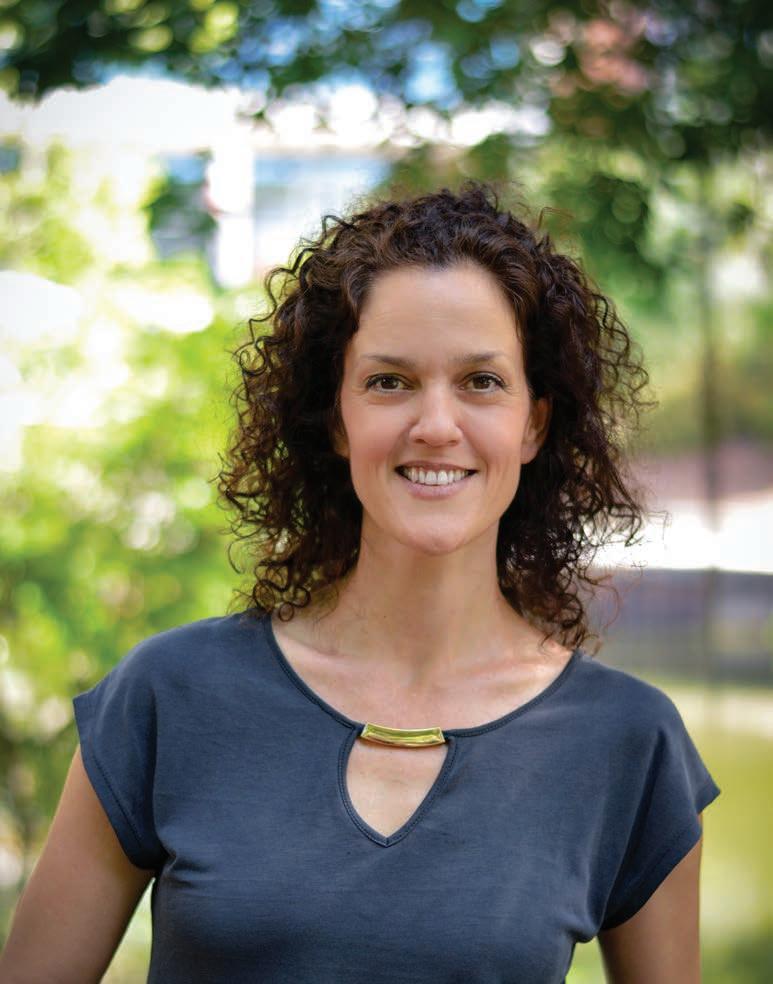
HEALTH & HUMAN PERFORMANCE | SUMMER 2023 21 FACULTY RESEARCH
Shahar Almog health education & behavior Ph.D. student
Catching the last-minute bus to work. Carrying that hot cup of coffee around to the office. What seem like routine tasks are actually powered by the complex motor movements of the body. Walking the dog or getting around the supermarket requires mobile adaptability — the ability to adjust to changing environments and walking speeds. This ability begins to reshape or diminish with age depending on one’s health.
Literature on the differences in walking adaptability between age groups remains limited. But researchers from the Applied Neuromechanics Laboratory in the Department of Applied Physiology and Kinesiology have stepped
up through a collaborative effort from departments across UF for the paper Kinematic analysis of speed transitions within walking in younger and older adults.
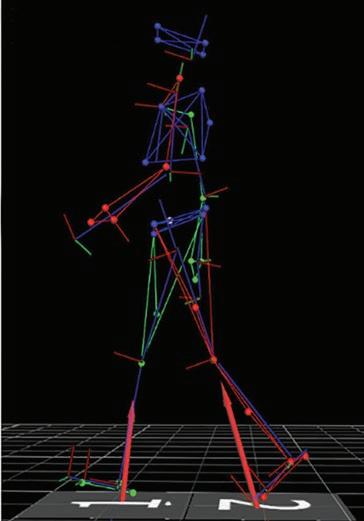
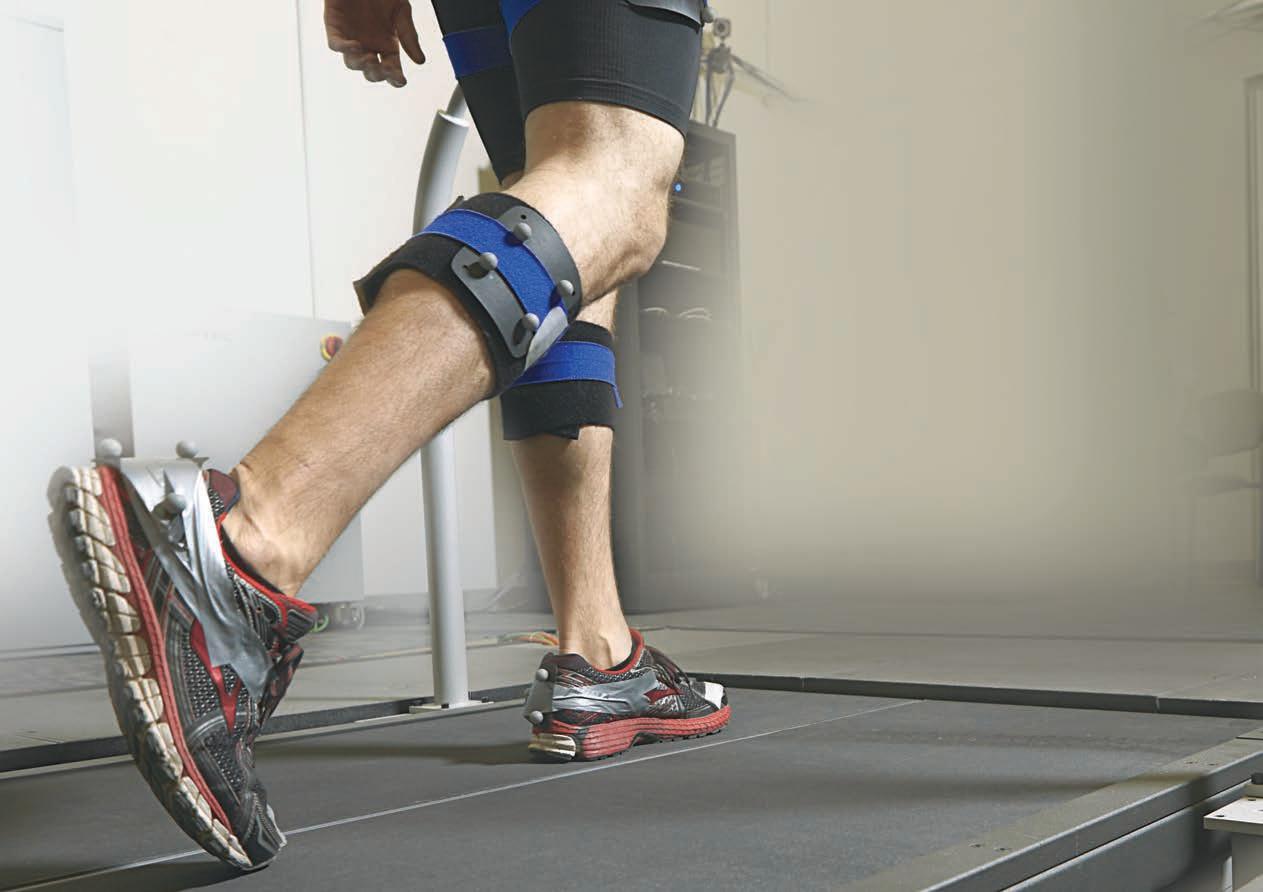
Francesca Wade, Ph.D., is a postdoctoral researcher in applied physiology and kinesiology and the primary author of the study. She joined HHP after earning her doctorate and is co-advised by Chris Hass, Ph.D., professor in applied physiology and kinesiology, and David J. Clark, associate professor in the Department of Physiology and Aging.
Wade joined HHP equipped with research knowledge in sport injury and more specifically ankle sprain
injury. For her Ph.D., she studied the ankle joint structure during ankle replacement in older adults and now explores the effects of aging on mobility.
Last year, Wade contributed to ongoing research at Hass’ Applied Neuromechanics Lab by collecting biomechanical data as part of a larger project funded by the National Institute of Aging.
MOBILITY
Studying the physiological differences in walking adaptability between younger and older adults is helping researchers understand the parts of the body affected and how to address quality of life and health issues as these parts weaken with age.
The institute granted five labs at UF, including Hass’ lab, the Mind in Motion grant which has helped support a plethora of research involving human movement. Wade’s data collection and analysis stems from the countless data produced over the years thanks in part to the grant.
Research participants of various ages were measured for different health factors such as blood flow, electrical potentials and brain activity and were studied using motion capture and other scans as they conducted 16 unique mobility tasks. Wade focused on analyzing and creating code for the motion capture of participants' increasing and decreasing walking speed transitions.
Here, Wade found that plenty of research had been done on athletes, runners and younger people and how they adjust to changing speeds while running on a treadmill. But little had been conducted using walking and on older populations. Targeting this demographic would help develop knowledge of the parts of the body,
including the ankles and hips, that are used for these transitions in speed and how health issues can be addressed when these parts weaken with age.
For example, an older adult who experiences a fall may feel apprehensive about leaving the house and entering a crowd where they may require the mobile adaptability that they no longer have or is limited,
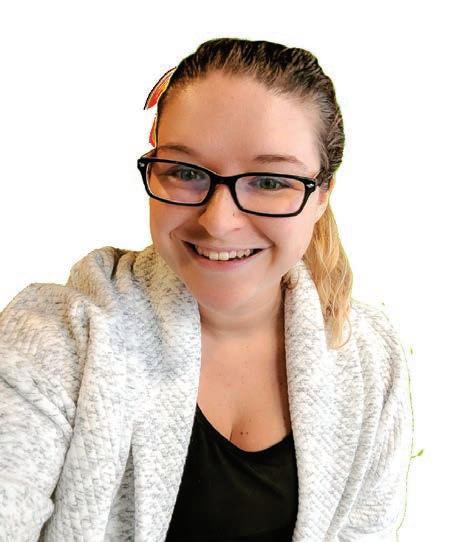
“Being able to independently move yourself around the world goes a long way in having a good quality of life,” Wade said. Wade worked with previous data by creating a method to track the center of mass velocity, or how fast the center of one’s body is moving, and analyzing changes in walking speeds. She was also able to conduct her own research by using motion capture to track participants walking on treadmills and by signaling them to slow down and speed up at different times. These instructions
simulated braking and propulsion in one’s gait, or manner of walking.
“Pushing yourself forward and then slowing yourself down happens all the time,” she said. “Whenever you need to speed up at a crosswalk or slow down because someone pushed their shopping cart in front of you, you’re reacting to your environment.”
She would find through her research that younger adults use their entire lower leg, including the ankles, knees and hips, to drive deceleration and acceleration while older adults relied more on their hips. Older adults also have greater dorsiflexion (the lifting of the foot) and lesser knee flexion (bending of the knee).
The next step, though, is to determine where this difference stems from whether it be muscle activation or gravitational forces. However, for now, Wade feels confident that the research has helped make headway into recognizing the physiological differences older people undergo when walking in daily life and how their health issues can be addressed by professionals.
aging MOBILITY &
 by Manny Rea
by Manny Rea
HEALTH & HUMAN PERFORMANCE | SUMMER 2023 23
FACULTY RESEARCH
Every year, the college recognizes alumni, faculty, staff, students and friends making an impact within The Gator Nation and beyond. hhp.ufl.edu/springawards/23
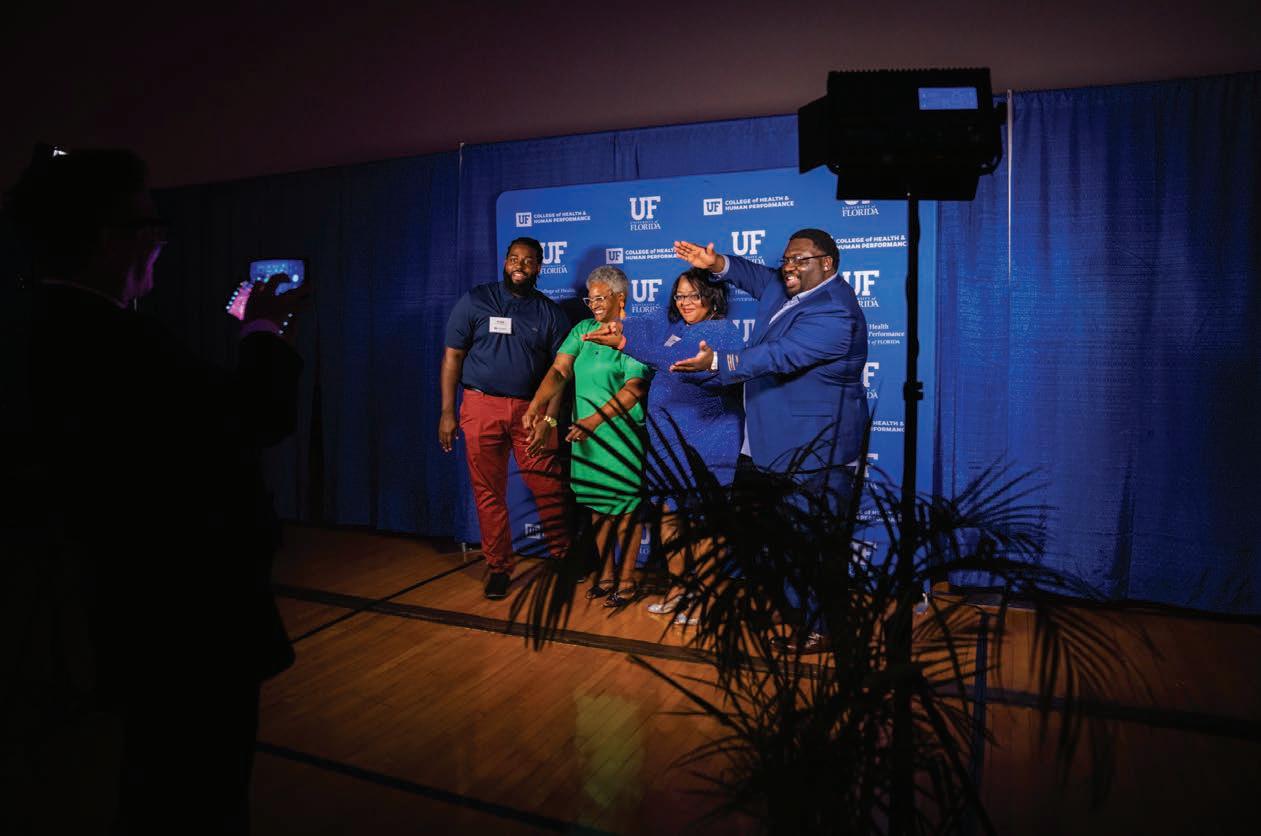
24 HEALTH & HUMAN PERFORMANCE | SUMMER 2023
awards
SPRING
This year's ceremony recognized HHP’s finest community members including our Outstanding Young Alumni and the latest inductees to the Alumni Hall of Fame. Each honoree was awarded a plaque and will be publicly memorialized by the addition of a newly engraved brick in the Florida Gym courtyard at the college's main entrance.
2023 OUTSTANDING YOUNG ALUMNI
Joe DaSilva, BSSPM ’14
Joe DaSilva is a man who lives by the inspiring motto, "Good, better, best. Never let it rest. Until your good is your better and your better is your best." He is a dedicated mentor in his community for more than eight years, and in his current position with iHeartMedia, he's putting his sports broadcasting expertise to work helping brands reach new audiences.
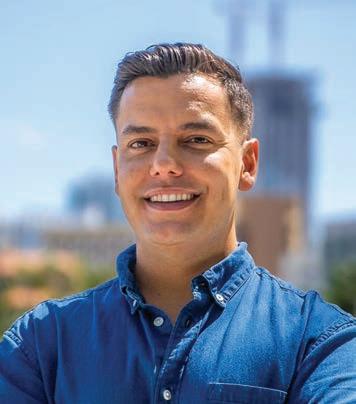
Annabelle Juin, BSSPM ’17, MSSPM ’18
Annabelle Juin started her career in sports and event management interning for the Stephen C. O’Connell Center. She has since planned large-scale events like the NCAA Men’s Final Four, NFL Pro Bowl and the DoD Warrior Games, and managed event budgets exceeding $5 million. When she isn’t on the road, Juin enjoys spending her time on the trails in the Colorado mountains hiking, camping and backpacking.
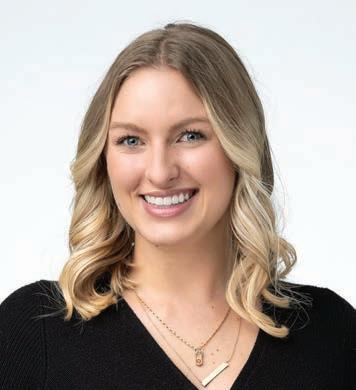
Bryant Seamon, BSAPK ’10
Bryant Seamon, PT, DPT, Ph.D., is an assistant professor in the Division of Physical Therapy at the Medical University of South Carolina (MUSC). Seamon's research investigates novel ways for clinicians to use information from clinical outcome measures, biomechanics and neurophysiology to inform precision treatment for post-stroke walking impairments. In addition to teaching and research, he regularly provides physical therapy services for underserved persons at MUSC’s pro-bono CARES clinic where he is on the board as a faculty advisor.
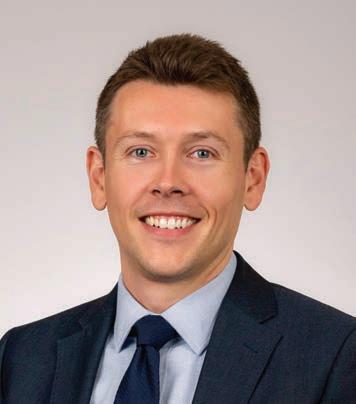
HEALTH & HUMAN PERFORMANCE | SUMMER 2023 25
ALUMNI RECOGNITION
Leigh Feenburg BSHSE ’04
“Proven leader; strategic visionary; selfless teammate; a man of honor, integrity and courage” are just some of the words used to describe Leigh Feenburg by those who have worked closely with him over the years. When words alone don’t suffice, Feenburg’s impressive track record as a team builder, innovator and difference-maker in the lives of others speaks for itself. Feenburg is the first CEO of Frontline Dental Implant Specialists, the world’s first dental implant partnership network focused on partnering with the best implant-driven practices to provide life-changing smiles.
Previously, Feenburg was CEO of Mid-Atlantic Dental Partners and was instrumental in the company’s rise to being one of the top dental support organizations due in large part to their rapid growth to more than 240 practices. Prior to Mid-Atlantic, Feenburg was VP of operations at Great Expressions Dental Centers, helping them reach more than 300 practices nationwide.
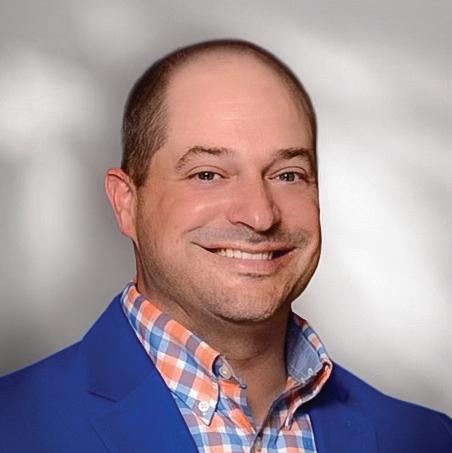
Feenburg is a self-described obnoxious member of Gator Nation. His wife of 16 years, Samantha, is a professional figure champion in bodybuilding. Their son, Zack, is a high-level soccer player.
Leisha McKinley-Beach is an author, thought leader, inspirational strategist, trainer and community organizer. McKinley-Beach is the founder and CEO of The Black Public Health Academy, which prepares Black health department employees for executive leadership positions, and Leisha.org, which provides HIV and general health information for communities of color.
Mckinley-Beach also serves as a national consultant who provides training and community engagement on Black health issues, including HIV, medical mistrust, racism in public health and cultural humility. She has been fortunate to participate in nationally recognized projects such as PrEP in Black America; Risk to Reasons, a national movement to retire the word “risk” associated with sexual health for women; the Florida Department of Health Sistas Organizing to Survive (SOS), a first-ever statewide campaign to address HIV among Black women; and initiatives to engage faith-based communities in the HIV response across the South.
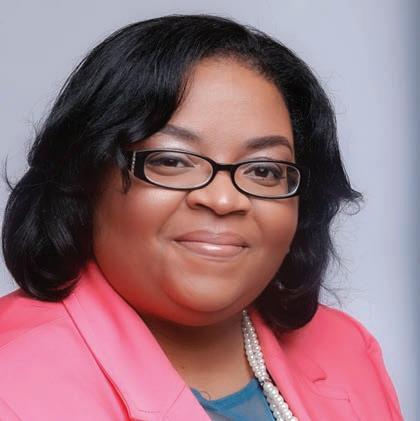
26 HEALTH & HUMAN PERFORMANCE | SUMMER 2023 2023 HHP SPRING AWARDS
Leisha McKinley-Beach BSHSE ’95.
2023 ALUMNI HALL OF FAME
HHP has been naming alumni to our Hall of Fame since 1997. To see past honorees, visit...
hhp.ufl.edu/alumni/distinguished-alumni
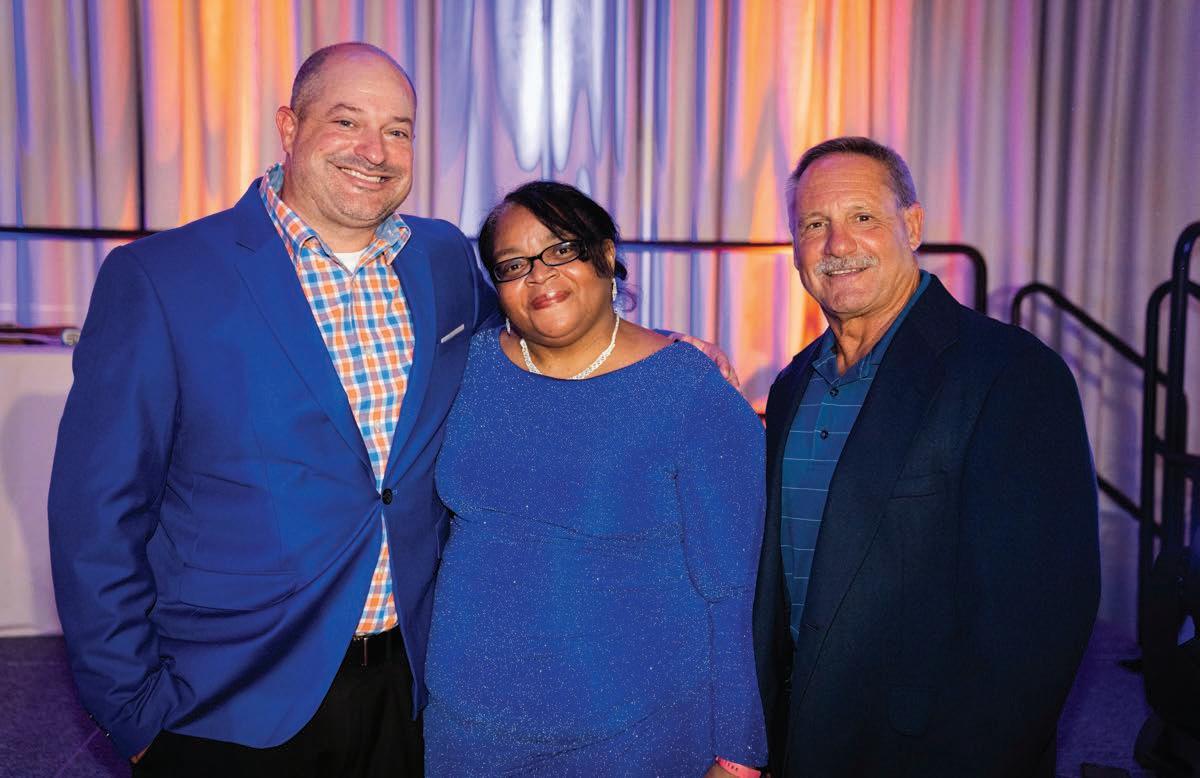
HEALTH & HUMAN PERFORMANCE | SUMMER 2023 27 ALUMNI RECOGNITION
Gordon Glover BSESS ’01, MESS ’02.
Gordon Glover is a two-time UF graduate who went on to receive his law degree from Florida State University in 2005. He is the founder of Glover Law Firm, with offices in Ocala and The Villages, where he focuses on commercial litigation and personal injury. In addition to achieving professional success, Glover has given back to UF. Glover has served on the UF Alumni Association Board of Directors since 2018. He has also served as an adjunct professor at the UF Levin College of Law, helping to educate future Gator lawyers. Glover’s peers elected him as the 201516 president of the Florida Bar Young Lawyers Division—an organization overseeing 25,000 young lawyers. Since 2021, he has served on the Florida Bar Board of Governors. Glover has earned a reputation as one of the bar’s most forward-thinking and hardest-working leaders.
In his community, Glover serves as president of the Public Education Foundation of Marion County Board of Directors. He is also the past president of the Boys & Girls Club of Marion County Board of Directors. Glover has strived to leave a lasting impact on UF and his community. Glover lives in Ocala with his wife, Ashley (BSBA ’01), and their four kids.
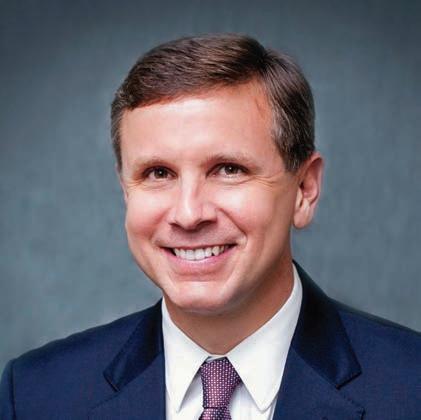
2023 ALUMNI HALL OF FAME
Residing in Kenoza Lake, New York, and Delay Beach, Florida, with his wife Rita and their black Labrador retriever, JD, Joe Russo is a former UF wrestler turned coach and physical education teacher at Lindenhurst High School in Lindenhurst, New York, his alma mater.
For more than 30 years, he coached wrestling, track and field, and strength training, producing numerous champions and All-Americans at high school and college levels. As an Olympic wrestling official for more than 40 years, he officiated eight world championships on five continents and was head staging manager at the 1995 World Championships and 1996 Olympics in Atlanta. Russo's involvement in Olympic officiating also led to a small role in the 2013 film "Foxcatcher," based on the true story of the murder of Olympic wrestling champion Dave Schultz.
Russo's contribution to the sport of wrestling has been acknowledged with inductions into both the National Wrestling Hall of Fame and Suffolk County New York Sports Hall of Fame. He now enjoys his retirement pursuing his hobbies, including hunting, fishing, kayaking, hiking, raising Labrador retrievers, going to the gym and attending wrestling events.
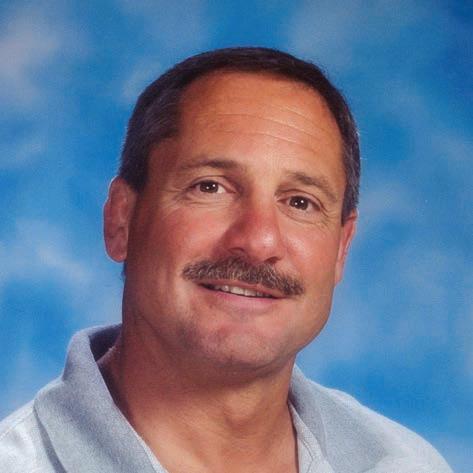
28 HEALTH & HUMAN PERFORMANCE | SUMMER 2023
2023 HHP SPRING AWARDS
Joe Russo BSPE ’77
SPRING awards
Next year's ceremony will be FRIDAY, APRIL 12, 2024 @ 6:30pm
Save the date!
Award nominations open this fall — consider nominating a member of the HHP community. For more information about the awards and for details regarding the nomination process, visit hhp.ufl.edu/springawards.
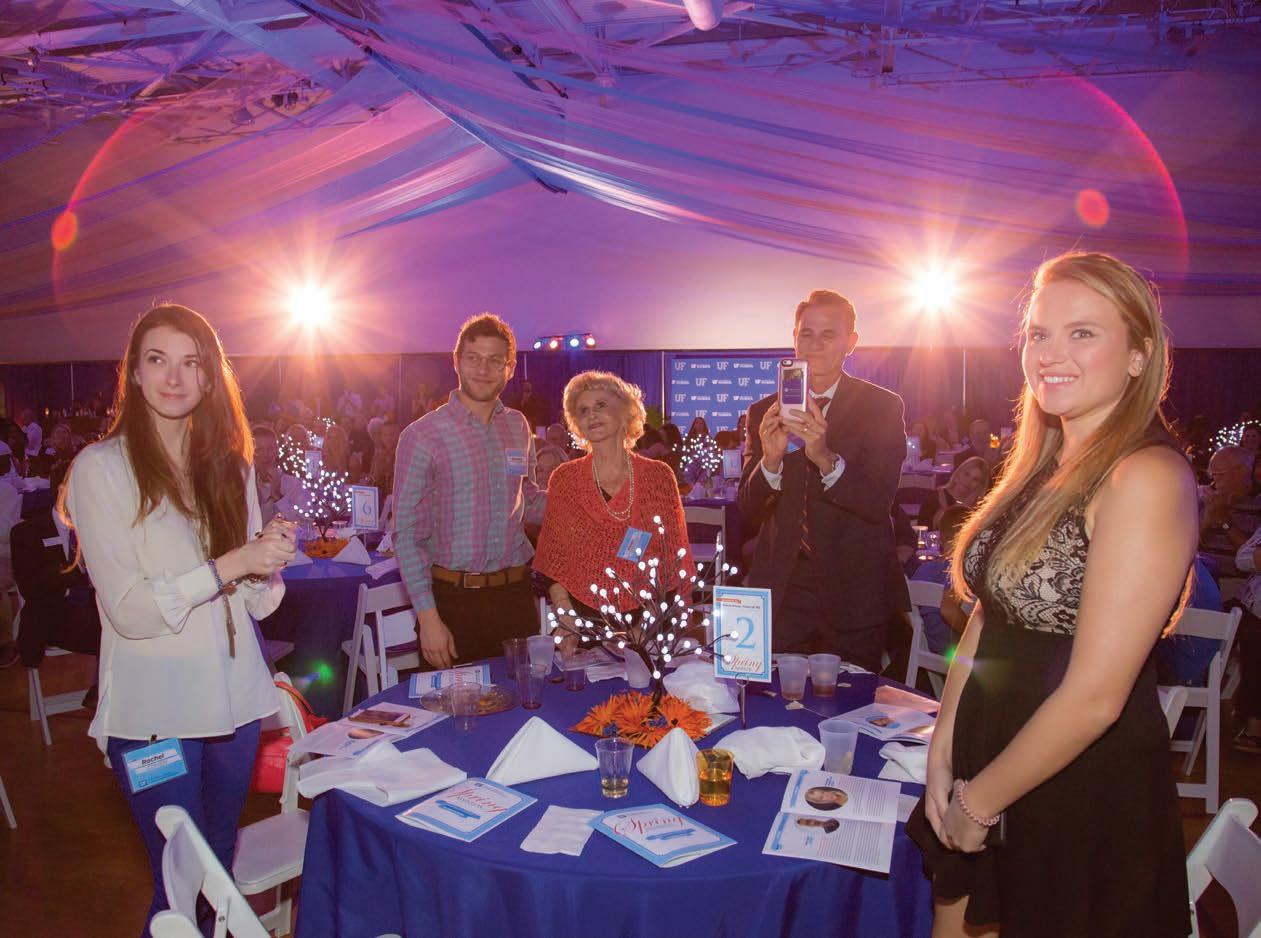
ALUMNI RECOGNITION
HHP by the numbers
Out of 16 UF colleges and schools, HHP is the 6th largest by enrollment
STUDENT ENROLLMENT 2,942 FACULTY 77 EMPLOYEES (including faculty) 132 ALUMNI 23,000+
5 study abroad programs include Australia, Cape Town, Germany, London and Paris, and Thailand
DEGREE PROGRAMS and CERTIFICATES
13 on-campus and 10 online
Annual Degrees Awarded (2022-23)
122 scholarships were awarded, expanding access and opportunities to deserving students
In addition, HHP awarded 22 graduate certificates, 48 undergraduate certificates and 74 minors, including certificates in artificial intelligence and data analysis
PARTNERING WITH INDUSTRY LEADERS
5 industry advisory boards with more than 50. board members represent all HHP disciplines..
50+ Industry partnerships including...
• Michael J. Fox Foundation
• NASA
• NASCAR
• NIH
• The Parkinson’s Foundation
• Tyler’s Hope for a Dystonia Cure
• United States Tennis Association
• The Walt Disney Company
• Women’s Tennis Association
30 HEALTH & HUMAN PERFORMANCE | SUMMER 2023
23
DEPARTMENT DOCTORAL MASTER’S BACHELOR’S TOTAL Applied Physiology & Kinesiology 13 125 2 24 362 Health Education & Behavior 3 6 4 175 242 Sport Management 4 167 178 349 Tourism, Hospitality & Event Management 2 2 2 75 99 TOTAL 2 2 378 652 1,052
RESEARCH SUCCESS
For the past five years, HHP researchers have contributed to 980 articles to high-ranking journals.
$10 million in research expenditures including NIH, NASA, and more.
Faculty contribute to 18 active NIH grants focused on movement disorders, risky drinking, mental health, pain and additional health-related research topics
Faculty hold 24 honors and fellowships in 13 distinct academies, associations and societies including the Academy of Nutrition and Dietetics, American Physiological Society, North American Society for Sport Management, and International Academy for the Study of Tourism.
4
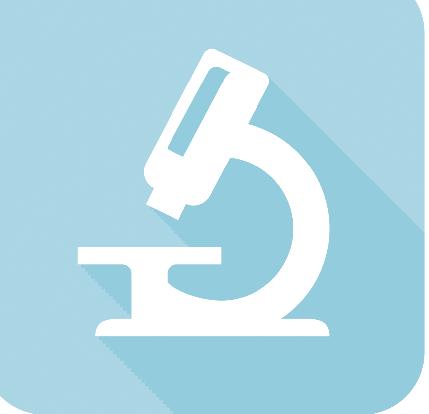
collaborative centers and institutes within HHP include...
• Center for Behavioral Economic Health Research
• Center for Exercise Science
• Eric Friedheim Tourism Institute
• Institute for Coaching Excellence
Our faculty experts are in the news...
RECORD-SETTING PHILANTHROPY
$12.3 million raised, surpassing $10 million goal
$5.3 million doubles college’s endowment
39 newly endowed funds established
31 new estate and planned gifts formalized
Go Greater Campaign Highlights
STUDENT SCHOLARSHIPS, SUPPORT and RECOGNITION
• 47 scholarships and fellowships, doubles prior campaign offerings
• 5 newly established internship funds
• 1 Wellspring Foundation Student Award, recognizing outstanding student achievement
FACULTY & STAFF RECOGNITION
• 1 Orchid Chair in Applied Physiology & Kinesiology, first endowed chair for HHP, joins 3 existing endowed professorships and 2 pledges by generous donors
• 1st staff professional development fund, rewarding outstanding HHP staff and adding to professional development
HEALTH & HUMAN PERFORMANCE | SUMMER 2023 31
student spotlight
Where are you from? Fort Lauderdale, Florida
How has HHP equipped you for the future? As a firstgeneration college student, it is comforting to know that HHP is devoted to helping students secure a once unattainable future.
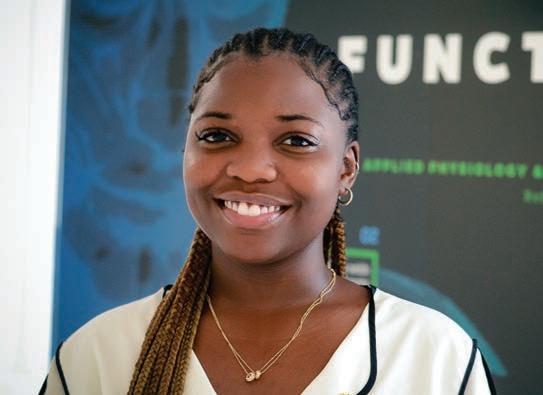
Do you have a favorite class? My favorite classes are always my APK classes. Among those, “exercise prescription” with Dr. Gordon has been the best class I have taken so far.
What one piece of advice would you give your freshman self? Stay confident in who you are and give yourself grace.
What is your favorite Gator tradition? Watching the sunrise or sunset at Paynes Prairie gives me a chance to take a well needed pause from academics and bask in the beauty of nature.
In the future, I aspire to… enter the medical field as a physician assistant specializing in orthopedic surgery or emergency medicine.
Where are you from? Okeechobee, Florida
Where are you interning? This summer I am interning for Torch Relay planning a torch relay run in Gainesville to raise money for Children's Miracle Network.
Do you have a favorite class? My favorite class that I have taken at UF is “sport marketing” because my professor, Yonghwan Chang, was very engaged in the class and super helpful.
Favorite thing about UF? My favorite thing about UF is the large amount of students who go to this school. I graduated from a high school with a class of 269 students so at first it was a lot to adjust to but now I love going to a large university because I get to interact with new people almost everyday.
Who within the college has had the biggest impact on you? The person who has had the biggest impact on me is Laine Hatcher. She is an amazing academic advisor.
In the future, I plan to… become a contract lawyer for the NFL or NBA.
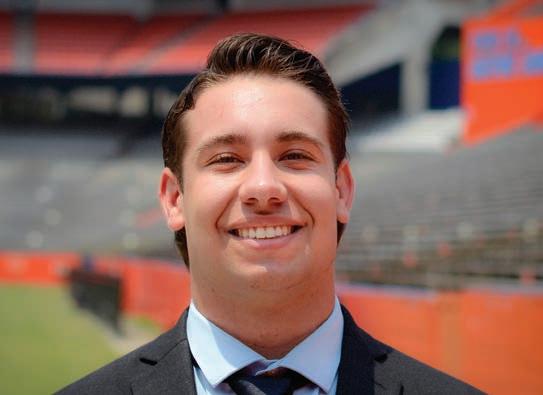
32 HEALTH & HUMAN PERFORMANCE | SUMMER 2023
Kaniya Battle BS Applied Physiology & Kinesiology, '24
Christopher
Cobb BS Sport Management, '25
“HHP leads to a stream of lifelong connections, exciting experiences and strong support systems with ample opportunities for mentorship, internships and research.”
“Through HHP, I have been prepared for my future thanks to amazing faculty that are always there to help.”
Where are you from? Boston, Massachusetts
What has been your favorite class at UF? My favorite class was “emotional health and counseling.” This course truly resonated with me, providing profound insights into emotional health, its impact on overall wellbeing, and the crucial role of effective counseling.
What is your favorite Gator tradition? My favorite Gator tradition is the Gator Chomp. The iconic arm motion and chant unites fans and creates an electrifying atmosphere at sporting events. It symbolizes our collective pride, spirit, and support for our teams.
In one word, how would you describe HHP? Inspiring
Where is your favorite place to study? The Marston Science Library. The quiet atmosphere, ample resources, and comfortable study spaces make it an ideal spot for focused learning.
In the future, I plan to… become either an OB/GYN or pediatrician, driven by a deep desire to make a tangible difference in people's lives.
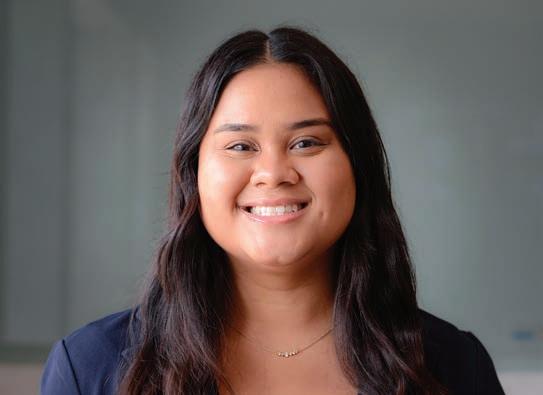
Where are you from? Born in Misawa, Japan — from Crestview, Florida
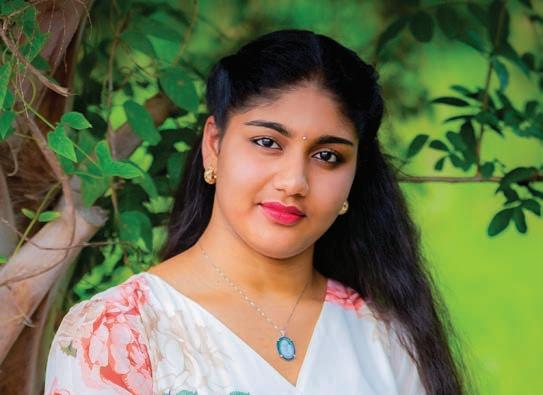
How has HHP equipped you for the future? I've not only been taught by industry experts, but I've met professionals across the hospitality industry. For example, the HHP Internship and Job Fair allowed me the chance to work with an events coordinator from the City of Gainesville's Parks, Recreation and Cultural Affairs Department.
Why did you choose UF? I chose UF due to its highranking status, in-state tuition and commitment to alumni following graduation.
What’s your favorite thing about UF? The community I've built here and the pride we share as Gators — I have made friends in classes, organizations, and through events who all are so proud of the Gator Nation and what we represent.
In one word, how would you describe HHP? Innovative
In the future, I plan to… take the knowledge I've acquired and apply it to my career as a corporate event planner.
HEALTH & HUMAN PERFORMANCE | SUMMER 2023 33
Rishitavani
Donapati
BS Health Education & Behavior, '24
Christina Ramos BS Tourism, Hospitality & Event Management, '24
“The emphasis on cross-disciplinary learning and the incredible support from faculty and peers alike make HHP a nurturing ground for intellectual growth”
HHP STUDENTS CHANGE THE FUTURE
“With expert professors, small classroom sizes and internship opportunities, HHP is devoted to supporting students in their journey of finding their passions and accomplishing their dreams.”
class notes
1980’s
Elvis Brandon, MSESS ’88, was named associate dean of the College of Professional Studies for Carson-Newman University.
The Gator Nation is Everywhere: Joan Carroll, MAPE '84, Ph.D. '92, and Benny Vaughn, BSHSE '85, send greetings on a recent trip to Botswana. >>
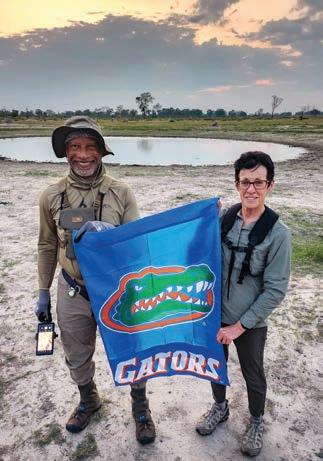
1990’s
Fitz Koehler, MSSPM ’98, recently released the “Healthy Cancer Comeback” series.
Koehler combines her fitness expertise with her own cancer experience to help other patients and survivors to prevent decline and regain power and strength post-treatment.
Roger Steinberg, BSESS ’91, accepted the position of low vision product manager at HumanWare, where he aims to develop low cost, stylish wearable magnification devices to empower persons with impaired vision.
2000’s
William Atkins, Ph.D., BSR ’09, became the associate vice provost for university life at University of Pennsylvania.
Steve Mesler, BSESS ’00, delivered the address at the HHP recognition ceremony this spring. Mesler is a three-time Olympian, a world champion and part of the four-man sled that won gold at the 2010 Vancouver Games. He also co-founded and leads the international award-winning NGO, Classroom Champions, which improves student achievement and mental health through athlete mentoring in schools. Watch the address: go.ufl.edu/mesler.
Michael Ferguson, Ph.D. ’02, published the speculative fiction book, “The Genesis 6 Project.”
Christina Ramos, BSR ’07, executive director and administrator of Touching Hearts at Home in Gainesville, was recognized with a Fierce Award, celebrating Gainesville’s most influential women.
2010’s
Chynna Clayton, >> BSR ’10, CEO and founder of Matriarch Made Development and former director of travel and event operations for Michelle Obama, delivered the keynote lecture, “Having a ‘ready for anything’ mindset: My path to the White House,” at HHP’s annual D.K. Stanley Day. Clayton's lecture covered her journey to UF, experience working in various capacities for the White House and lessons learned along the way. Watch the lecture: go.ufl.edu/dkday23.
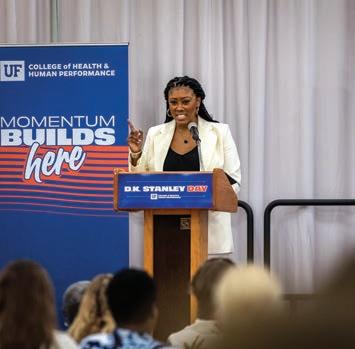
Mark Daigneault, MSSPM ’13, coach of the Oklahoma City Thunder, was runner up for NBA Coach of the Year.
Colby Kash, DC, BSAPK ’17, authored “The Autoimmune Plague: How to Regain Sovereignty Over Your Body and Life.” In the book, he talks about his journey with three autoimmune diseases and provides a blueprint for regaining health.
Ryan Lochte, BSR ’11, 12-time Olympic medalist in swimming, appeared on the first season of Peacock’s reality game show “The Traitors” this spring.
Christian Taylor, BSSPM ’19, two-time Olympic gold medalist and four-time World Champion in the triple jump, returned to his hometown, Fayetteville, Ga, to host the Christian Taylor Invitational with 26 competing high schools.
2020’s
<< Russell Gaither, MS APK ’22, won the Lamar Hunt U.S. Open Cup, as a performance specialist with the Orlando City Soccer Club. The trophy was the first for the Major League Soccer club. Read his profile: go.ufl.edu/gaither.
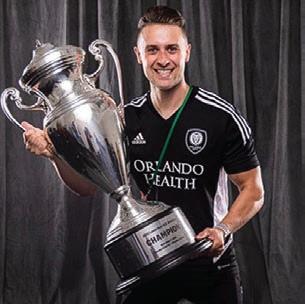
HAVE NEWS TO SHARE?
HHP is always looking for news to share in future editions and on social media. Submit your news at hhp.ufl.edu/communications
34 HEALTH & HUMAN PERFORMANCE | SUMMER 2023
RETIREMENTS
Doug DeMichele, Instructional Professor in sport management >>go.ufl.edu/demichele
Shari Mack, administrative assistant in the dean’s office >>go.ufl.edu/smack
INDUSTRY UPDATES
HHP Welcomes Industry Partners
This year, the College of Health & Human Performance established four new industry advisory boards with the goal of breaking down barriers, perceived and actual, between academia and industry. Focusing on areas like advising, advocacy, philanthropy and oncampus engagement, board members collaborate with college leaders to improve the curriculum and provide opportunities for students.
The four new advisory boards, comprising 24 new board members, join the Eric Friedheim Tourism Institute, first established in 2010, in building connections and giving back to the next generation of HHP Gators.
Learn more and consider getting involved at hhp.ufl.edu/partnership.
DEGREE DESIGNATIONS
BACHELORS
BSAPK, applied physiology and kinesiology
BSESS, exercise and sport science
BSHE, health education
BSR, recreation
BSPE, physical education, health and recreation
BSSPM, sport management
BSTHEM, tourism, hospitality and event management
DEATHS
Don Hester, BSPE ’53, MPH ’60, West Palm Beach, Fl, associate professor emeritus, August 22, 2022 at 90
<< Michelle Park, BSR ’76, St. Augustine, Fl, March 22, 2023 at 68
Keith Tennant, professor emeritus, Vero Beach, Fl, January 13, 2023 at 80
Celebrating Five UFHHP Connected Businesses
Every spring, Gator100, hosted by the UF Alumni Association, celebrates the worlds’ 100 fastest growing Gator businesses. This year, five college alumni and board members were recognized with this distinguished honor:
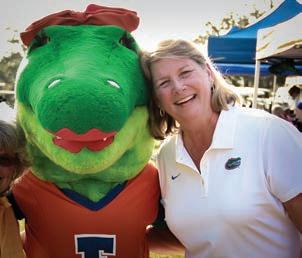
#25: FITBENCH
Erin Danen, BSHSE ’05, BS ’06
#34: Generation Income Properties
David Sobelman, BSESS ’96
#36: Walk-On’s Sports Bistreaux
Scott Taylor, BA ’96, COO/President
#44: Adobe Luxury Rentals
Rob Alday, BA ’03, Owner
#82: Veitia Padron, Inc.
Veronica Espinosa, BSSPM/BA ’13, Owner/CEO
Learn more: gator100.ufl.edu
For a more detailed list of current degrees, visit catalog.ufl.edu
MASTERS
MSAPK, applied physiology and kinesiology
MSHEB, health education and behavior
MSESS, exercise and sport science
MSSPM, sport management
MSTHM, tourism and hospitality management
DOCTORAL
DAT, doctor of athletic training
Ph.D., doctorate
HEALTH & HUMAN PERFORMANCE | SUMMER 2023 35
HHP ALUMNI MAKING A DIFFERENCE
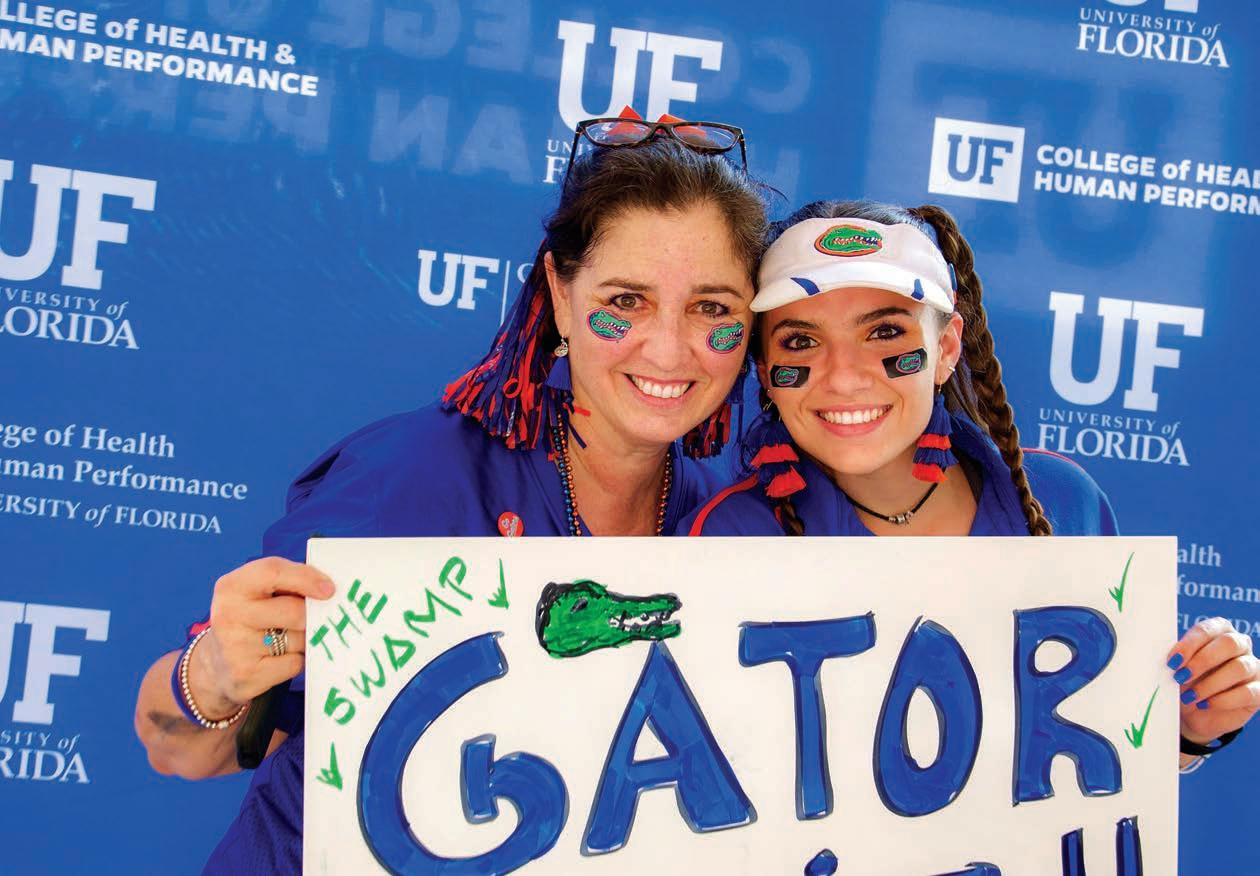
P.O. Box 118200 Gainesville, FL 32611-8200 2023 #UFHHP HOMECOMINGTAILGATE HHP.UFL.EDU/TAILGATE WELCOME HOME! Join us on Saturday, October 7, two hours before kickoff for a special college-wide tailgate. We promise food, photos, games and fun — bring the whole family! RSVP by September 23

















 by Manny Rea
by Manny Rea











 by Manny Rea
by Manny Rea



















